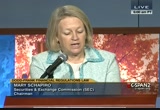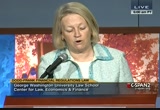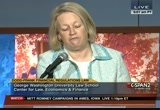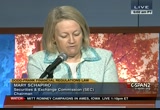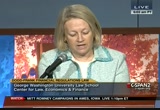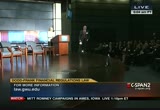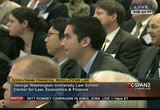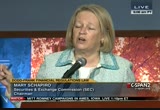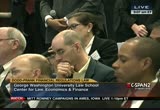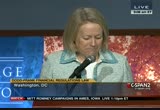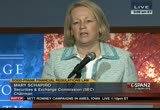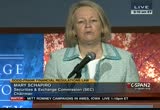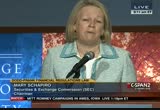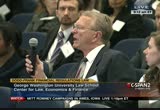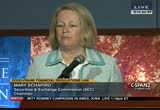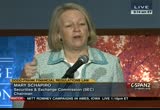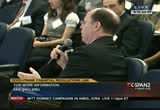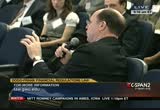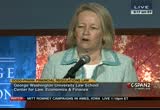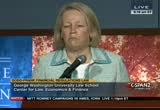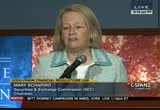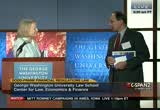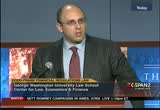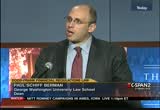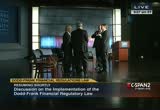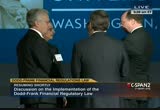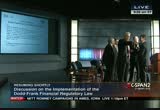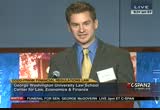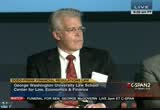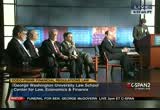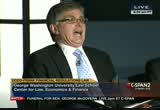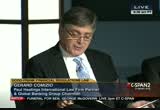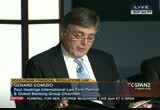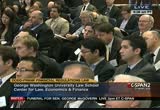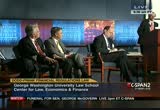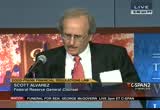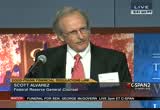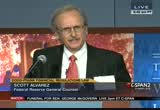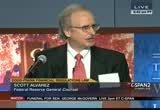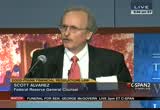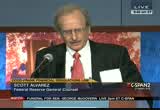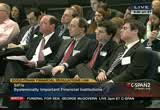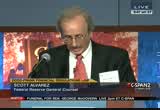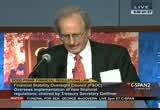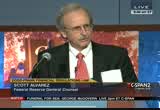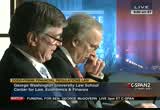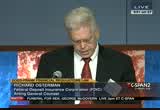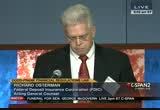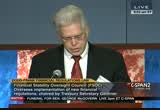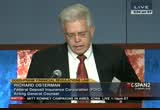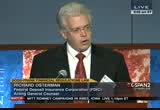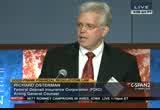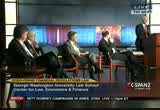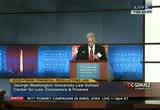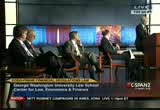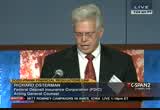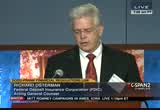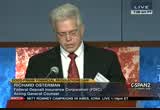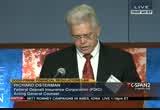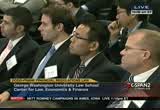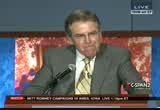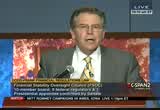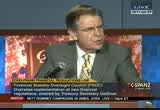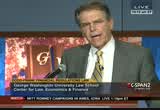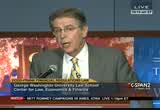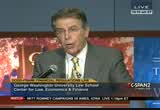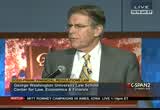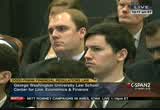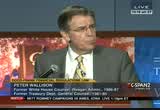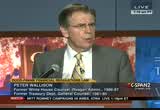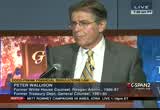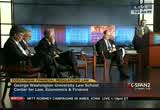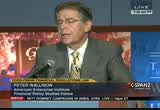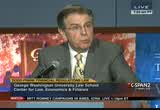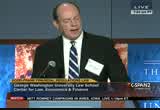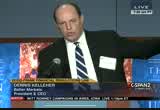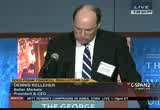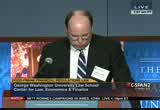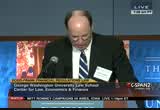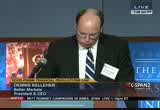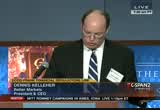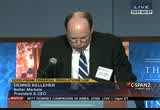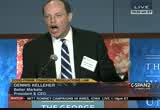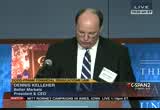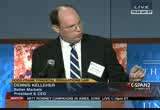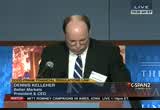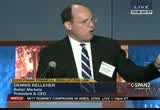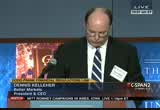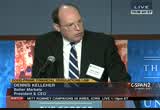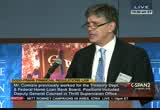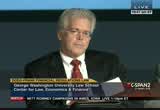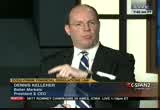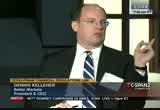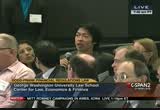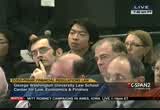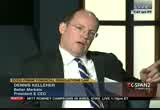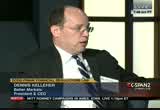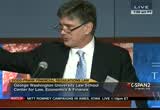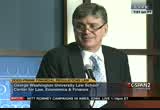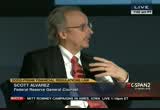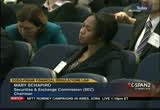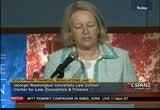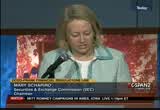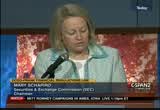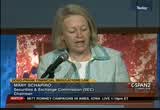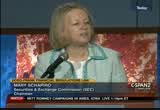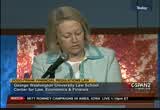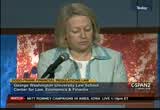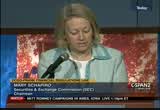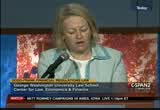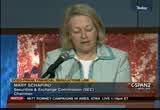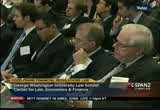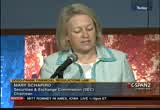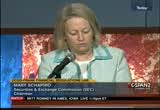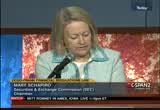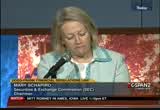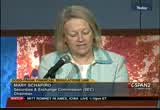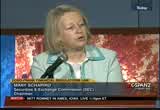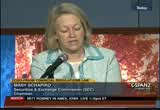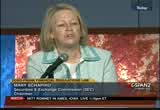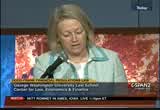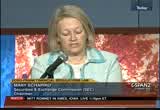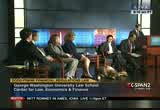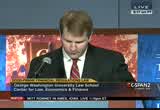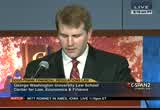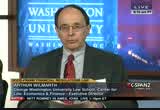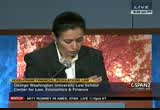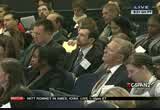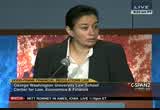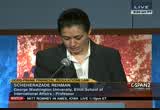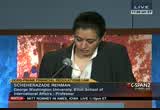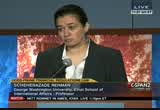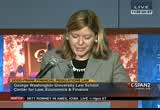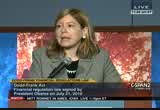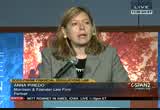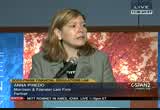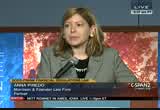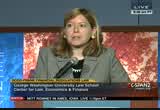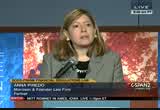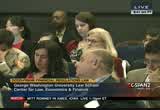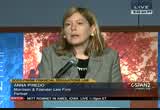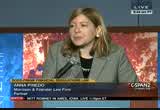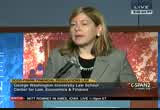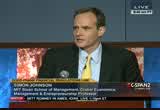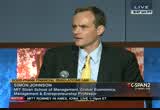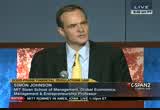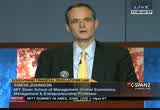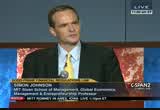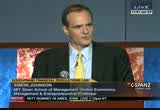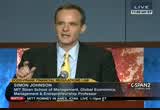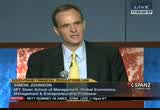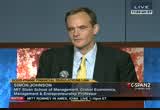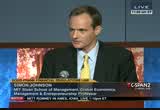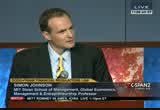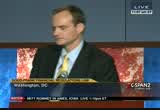tv U.S. Senate CSPAN October 26, 2012 9:00am-12:00pm EDT
9:00 am
information they need to make an informed judgment, and that if a vehicle through which they can express that judgment to the board. today, it appears that say on pay regulation affected to sec rules under dodd-frank is leading to improvements in communications in both direction. it has given shareholders a clear channel to communicate to their board satisfaction or a lack of satisfaction with executive compensation practices. and it is getting boards a powerful incentive to clarify to shareholders and make a clear coherent case for the compensation plan that the board has approved. the outcomes of these votes are not binding on the company under the law or on its board of directors, and they do not affect the validity of executive compensation arrangements. the advisory vote does, however, let boards know what shareholders think of compensation plan. and companies now have to disclose in their proxy
9:01 am
statements in the year following the vote how they responded to the most recent say on pay vote. a few compensation packages have actually been rejected, but even in many cases where shareholders approved the board's compensation strategy, a significant percentage of shareholders have often voted no. it's our expectation that no votes were even a significant vote against a company's executive compensation practices will force boards to ask themselves some very tough questions about the compensation policies, and about whether they're communicating effectively with shareholders about those policies. the say on pay regulations also require companies to provide shareholder with an advisory vote on the frequency of say on pay votes, at least once every six years. we understand that most companies consistent with the preferences of their shareholders have determined to hold say on pay vote every year. to me, this demonstrates that
9:02 am
shareholders won't force to remain focused on executive compensation, and i'm hopeful that these say on pay votes will focus boards on the incentives they are creating through their executive compensation policies. in this respect, say on pay builds on regulation the sec adopted. in 2009, to ask congress to detail the relationship between risk-taking and compensation. and to more fully discuss the approach to managing risk in this regard. regulations that probably facilitates board shareholder communications on the subject of risk management, whether through disclosure generally or say on pay deliberations, will result in greater board attention to risk-taking incentives, and companies that are more resistant to the kind of financial epidemic that spread so rapidly from firm to firm in 2007 and 2008. the financial world is full of zero-sum games. it's one party to a currency
9:03 am
swap wins, the other party loses. if you short a stock, your profit or loss is exactly the same as the loss or profit incurred by the entity that bought your shares. but financial reform really isn't like that. of course, in individual cases, investors and consumers of financial products may have different priorities than brokers and banks. but broadly speaking, good regulation, rooted in fundamentals that are frankly no secret, transparency, risk management, fairness, broadly benefits all stakeholders. transparent market more efficiently distribute capital. better markets bring investors and the capital into the game. properly allocated and managed to risk curbs irrational behavior that can have devastating consequences. it's really not that hard to figure out. and fortunately there are powerful individuals and entities which profit, at least in the short run, from inefficiencies and audacity's, from differentials and information and power, and from
9:04 am
taking a rational risks knowing that profits and compensation will occur to them while losses are often assumed by consumers, shareholders, taxpayers, and the economy at large. i think dodd-frank recognizes this and builds a comprehensive structure on strong principles that protect both investors, make a wall street work better, and get down to the benefit of the financial system broadly. thank you. [applause] >> chairman schapiro has kindly offered to take a few questions. so if you wish to ask a question, please raise your hand. one of our astute volunteers will bring a handheld microphone to you. spent i can't see anybody. so it's really bright up here. >> questions for chairman schapiro?
9:05 am
>> thank you for your opening remarks. i was wondering if the sec was willing to adopt the financial stability board, kind of guidelines on executive compensation reform, what the europeans have adopted, but i'm not sure whether the u.s. is moving in the same direction? >> it's an ongoing subject of conversation at the sec, and i guess i would have to respond, we have jointly proposed as dodd-frank requires with the banking regulatory agencies a set of executive compensation disclosure rules, including pullbacks and delayed payouts and so forth. and as you can imagine a lot of comment and those rules are not finalized yet but we're working with the other regulators to do that. the second thing i would say is the sec's approach any area of
9:06 am
compensation has been a disclosure-based approach. if you look at the history of rule making in this area you can see ever greater requirements on public companies to disclose their compensation policies and practices, including as i mentioned rules we did shortly after i arrived that required compensation committees of boards to explain how their compensation practices may incentivize risk-taking and with the board is doing to manage that in synthesizing of risk so that the franchise and shareholders money is not unduly put at risk through the compensation practices. we have detailed compensation schedules that are contained in corporate filings, detailed disclosure about not just base pay and incentive bonuses, perks and other components of compensation, but we have intended at the sec with exception of the work we are
9:07 am
doing under dodd-frank with the banking regulation to take a more bank approached. >> thank you very much. >> and again, thank you very much or your remarks. is really an awesome task of the regulators have been put into develop this razor framework for over-the-counter derivatives contracts, and i have two questions. we are not linked in with the multilateral influence, and it concerns me that the sec and even our banking regulators are worried about other multilateral issues that are kind of put on a spyware g20, and that's not bashing u.s. compliance with g20 is not review. so one issue is where our regular framer, especially from the banks and the big financial
9:08 am
institutions, is influenced and you may not be able to speak to that, but the complications of what our big financial institutions under the power can get away with because they say that well, we're into these other jurisdictions, so it has some kind of leverage in the way against the sec. how do you handle that? and then, what about fair value? i mean, the over-the-counter derivatives contracts had not been able to enjoy balance sheets accounts, so to speak. so i'm a fair value reporting regime, the markets need to be stable. 2008 is in a wait state off iconic weighted -- quantitative easing. so whatever framework unless we get rid of the power of have that accounting and/or what is the nature of an over-the-counter derivatives contract.
9:09 am
>> [inaudible] >> let me take a crack at the first part because it's a very fair question. it's very complicated and it is very challenging to regulate in a world where virtually nothing stops at our fiscal borders of the united states. and it's so particularly to in financial markets where the velocity with which money and transaction pass around the world is quite extraordinary. and so we can't assume that we can do only what we think works in the u.s. markets, although clearly the u.s. markets are our primary concern and focus. the way we go through these issues that is, we have dodd-frank, let's start with g20. apogee 20 level there's broad agreement about what needs to be done with respect to the derivatives markets, and it's been reemphasized and we commit to by the g20, including the united states over and over again. it's the valley of clearing but it's the valley of transparency
9:10 am
and trade reported that its the valley of collateralized in positions itself for the given ever high level of agreement and we worked after every country, individual regulatory regimes and legislative processes. one of the challenges is, frankly, the mismatch in time to dodd-frank was passed really before legislation anywhere else in the world. the japanese are probably the closest behind us, and we have set about to do as congress has directed us to do to implement this regulatory regime. regulators are working together internationally extremely well. it's a huge component of our job is to try to coordinate and collaborate to the greatest extent possible, understand where different underlying legal regimes and different underlying processes. but to give you a specific example, chairman gensler from the ctc and i have cohosted to
9:11 am
very detailed working sessions with principal regulators of derivative markets around the world in the past year it will have our next session in early november. where we're trying to work through the details of what i write is where regime looks like in comparison to, you know, europe, asia and governments as well. and our goal continues to be to try to create as collaborative and coordinated regulatory regime as we can possibly can, understanding that we won't be able to identical -- be identical. the goal is not to go to the jurisdiction with the lowest standards, nobody wants to see that happen. goal also is not to multilateral institutions, multinational institutions subject to conflicting rules and requirements in different jurisdictions so that it becomes impossible or unbearably costly to do business.
9:12 am
so it's a major reason why it's taken this long as it is, frankly, to get the derivatives regime in place, because collaboration and consultation takes a lot of time. but i continue to be optimistic that we will work through with a regulatory colleagues around the world. you know, reasonable framework that will serve the goal of closing gaps and not creating opportunities for regulatory arbitrage. >> [inaudible] >> the sec has announced a goal of reducing reliance on large rating agencies. but you also raise the cost of regulation to those agencies, because there's more disclosures. you described by greater transparency. how would small, new rating
9:13 am
agencies be able to shoulder those kinds of regulatory expenses, and be able to compete with the big three rating agencies? isn't there a problem? >> that's a great question, and one of the goals of a lot of the regulation we have done is to try to encourage more entrants into this space so that we don't have what is essentially three rating agencies doing north of 90% of the ratings work. it is really important for regulators to reduce their reliance on reading so, given that investors have excessively relied on them as result of the financial crisis without doing, without doing sufficient of their own due diligence to ensure that the ratings weren't problematic. and, frankly, the model of rating agencies, the issue a model where i paid you, the rating agency to give me a rating, and you can all see very
9:14 am
clearly what the conflict of interest is there and it's a very strong conflict of interest. so we done a couple things. we have that new entrants into the rating agency space within the past year or so. we that i think two new entrants are so smaller entities are finding a way of creating niche in the market that works for them. they don't rate the full range of corporate structure proctored the new entrants might be specializing in particular areas which i think is a less expensive way to enter the space. we are also looking at as we are required to under dodd-frank whether there's another business model that we can be supportive of. we have the pay model as a separate there's also a subscriber pay model where the person presumably the institutional investor that uses the rating actually pays for the rating. the dodd-frank, something called franken and name it asks us to look at whether there ought to be a celebratory organization or even a government agency that
9:15 am
selects the rating agency. doesn't do the ring that selects the rating agency for each structured products transaction. so that you break some of that bond between issuer pays for the rating and a selection of the rating agency and the agency itself. so we're producing a report to congress that will sort of way the costs and benefits and practical implications of some of these alternative models to see if some of them might make any sense. but i do think that we have a new entrants into the space, and i think we will continue to see it be an appealing place for people to be. >> we have time for one more question. >> hi. just very quickly, the sec with the cftc, on the frontline, the rigors of our financial markets, the most important markets in the world and we can say with our typical self-centered narcissism in the united states, but i think generally agree, and
9:16 am
yet what we have turned into a financial reform and even before registering to regulate those markets are basically tiny underfunded regulatory agencies going up against massive markets, the derivatives market just shy of 700 trillion notional, nevermind the capital market, the complexity and otherwise, and yet we've got a cftc with about a $200 million budget, and an sec with slightly more than a billion dollar budget. it seems to me that one of the big problems we have is to defund agency. you haven't got the resources and the cftc doesn't have the resources and i know political appointee and a tough job you can't say that so not asking you to comment on the. i'm also not going pashtun only do think anybody really cares about our capital markets, whether you ostensibly care about in the wake jamie dimon says he is or if it's a man on the street should be advocating for more money for the agencies, you can't do that. but other skin. what i want to do, leave aside the president's budget, leave
9:17 am
aside your budget request and constraints, in your view, just theoretical, if the sec had the budget that it needed to do its job, what would that budget be? and your term is coming to an end. [laughter] >> but i mean, i think would put in context the battle you're against and what you really need and what people who care about what you do should be focused on. >> every day we do submit a budget. that is the amount of money we think we need to do the job. and we frankly don't get that number. as you point out because of the budget process. so we're pretty open and honest about come in our budget submissions what we need to do, and if we don't get that amount of money what we will not be able to do. in my almost four years at the sec we have invested heavily in technology, because the agency's technology is really in pretty dismal state when i arrive. we now have tools and
9:18 am
capabilities, the agency has never had before. and people think that's great, then you don't need to make people because you're using technology. might experience throughout my career as a regular is that technology allows you to work smarter and better and more efficiently, but it doesn't diminish the need for people because you find so many more things we have technology to do market surveillance, to look for insider trading, to look for market manipulation, to analyze, dinner, rmbs and cdos and how they been structured and see what the flaws are. while we put a big heavy emphasis on technology investment and we also need to continue to invest in our people. we been able to grow a little bit in the last couple of years. not enough but a little bit. i can't really give you a number. i will say that we are an agency at just under 4000 people, with extraordinarily broad responsibility for everything from accounting standards setting oversight, the money market funds and mutual funds,
9:19 am
the market structure. and we all read every day about market structure issues, to broker dealers how to interact with customers, and investment advisers to rating agencies and transfer agents. i mean, this is an extraordinarily broad scope of -- and now hedge funds has been added to of late and derivatives. we have extraordinarily broad -- and many sufficient funding to both keep up and to keep even with what's going on in the industry so that we can evolve as quickly as the industry can to respond to issues that are both systemic in nature and which really impact individual investors well being and their confidence and integrity of the marketplace. so we will continue to fight like crazy for additional funding. i have for four years. we get very close to so funding which is what the bank regulators all into a. they don't go to congress for a budget. they create a budget and you
9:20 am
live with it. we are not funded by the taxpayer, and the fact we have something called match funding which means cutting the sec's budget doesn't mean that money can go into else. we are funded by wall street. so if you cut our budget you actually cut expenses on wall street. so we think having matched funding is a great step towards self funding by the real answer is the agency, under obviously oversight of congress which, of which we have lots to be able to establish what it needs and find itself to get the job done. thank you all very much. >> chairman schapiro. [applause] >> chairman schapiro, thank you very much for being with us today. we appreciate willingness to share your views on the ongoing work of dodd-frank reform. we're very proud to have you. we really appreciate your long service to the law school as
9:21 am
well as your distinguished public service. we would like to give you a small token of our appreciation. we hope you'll come back often again. wonderful to have you. >> i will, thanks. upo[applause] >> so, we will reconvene at about 9:30 a.m. if you want to get coffee or whatnot. >> [inaudible conversations] ♪ ♪
9:22 am
♪ >> a short break in the george washington university law school forum, looking at the dodd-frank law. we will be back to outlook with live coverage and just to be. to let you know about some of our other live coverage coming up today, at 1:10 p.m. mitt romney campaigning in ames, iowa, with a speech from his campaign is saying mitt romney would use the speech today to quote help crystallize the differences between each candidates economic approach. we will have that live for you at 1:10 p.m. on c-span at 2:00, the funeral service for the late senator george mcgovern. we'll have that live from sioux
9:23 am
falls, south dakota. and begin back at george washington university, a law school for a on the dodd-frank law kicking off the morning just a short while ago with the dean of the law school setting up the discussion for the day. >> i'm the dean of the law school, as art said, and i want to welcome you to this conference and, obviously, welcome mary schapiro, the chairman of the u.s. securities and exchange commission. so, one of the things that i think makes this law school, george washington university law school, distinctive and different from other top law schools is the degree to which we are integrated into the real world of law and policy practice in this country. and so one of the things we are always striving to do is not be an ivory tower academic institution solely, but also one
9:24 am
that is always trying to engage the practice in basra, people from corporations, people who are not lawyers in the educational enterprise and also in public policy discussions. and, obviously, with a great advantage in, being in washington, d.c. and having so much access to the world of policy. but in addition it's not just the location. it has to be your orientation at the law school, and so it is something that i fantasized since i've arrived, but it long predates me that this school wants to always be the place to convene public policy discussions, to create a forum for actionable information, to create an opportunity for nonpartisan and bipartisan discussion. as i like to say, in d.c. but
9:25 am
outside the glare of d.c., not on a congressional hearing room floor, not on a formal interagency process, but in an academic institution where important policy discussion can be had. and maybe we can move the ball forward on important issues of thought leadership. in that regard we are thrilled to be able to host this conference and this is part of a series of conferences that we have held over the last few years on the important regulatory reforms of dodd-fra dodd-frank. >> we are back live at george washington university's law school forum on the dodd-frank law. you saw mary schapiro, the sec chairman just a short while ago. you can see that again in our video library in just a bit. the next panel which should get underway shortly to focus on whether the law went far enough. and among the speakers is the
9:26 am
9:28 am
9:29 am
law and the second panel here should get underway shortly. just let you know coming up at 1:10 p.m. we will bring you live coverage of mitt romney speaking in ames, iowa, on the economy. this is the report this point that the economy grew at a slightly faster 2% annual rate from july through september. "the associated press" says that's because it was, the economy was buoyed by more spending by consumers and by the federal government, where it was accelerating from 1.3% in the previous quarter to just over 2%. [inaudible conversations]
9:30 am
9:31 am
at full capacity, so please take a seat. there is no standing in the auditorium. >> okay. at morning everyone. first, on behalf of the students i would like to thank chairman schapiro very much for being with us today. second, let me welcome all of you to our first panel discussion, the subject of which is dodd-frank, too far or not far enough? my name is seth hunter, i'm a student here at george washington law.
9:32 am
i currently serve as president of our banking securities law group, which helps organize this event. and i can personally say that being a part of the symposia has been a real crown jewel of my law school experience, and it's thanks to the dedicated members as well as our distinguished guests, some of whom is now my pleasure to introduce. scott alvarez is general counsel for the board of governors of the federal reserve system. he has worked closely with the board and congressional staff regarding the dodd-frank act. gramm-leach-bliley and fdic improve in fact, among others. richard osterman is the acting general counsel of the fdic. previously he was the assistant general counsel for the general litigation section, which included her personal liability,
9:33 am
financial crimes and receivership operations and policy. peter wallison is the arthur f. burns fellow in financial policy studies at the american enterprise institute. prior to joining aei, he practiced banking corporate and financial law. mr. wallison also served as general counsel of the treasury department, and as white house counsel during the reagan administration. dennis keller -- kelleher as president and chief the old -- coo better markets incorporated, promoting public interest in the domestic and global capital and commodity markets. mr. kelleher has held several senior staff positions in the u.s. senate, most recently as chief counsel and senior leadership advisor to the chairman of the senate democratic policy committee. and finally our moderator,
9:34 am
gerard comizio, as a partner and chair of the global banking practice at paul hastings. he was formally the acting general counsel of treasury's office of thrift supervision. he was also previously a senior attorney in the division corporate finance in the u.s. securities and exchange commission. please give a warm welcome to our panelists. [applause] >> good morning. i'm honored to be the moderator of this distinguished panel. i know we'll have an interesting discussion, and hopefully debate. good news is we're not going to have to compete with monday night football and the baseball playoffs. gentlemen, let me take a couple of minutes to kind of set the stage for our discussion. what's fascinating is the dodd-frank act, landmark financial reform legislation has
9:35 am
provoked more controversy and discussion since it has been passed and even before it was passed. 2010 it was a pretty easy call for politicians in some respects going into the 2010 election cycle, because public opinion polls overwhelmingly seem to demonstrate that americans have a vivid awareness that a year implosion of the international u.s. economy had been narrowly averted by a massive infusion of government capital into the financial services industry, and trillions of dollars of guarantees and liquidity. and that this crisis is basically caused by some combination of whiskey and abuse of wall street practices and lax government policy and oversight. so, and that dodd-frank act was one. and in so doing it every major
9:36 am
provision seems many of these provisions haven't even been implemented to date come seem to generate controversy. whether it's the creation of the consumer financial protection bureau, that too big to fail policy of the federal government, skin in the game rules of the volcker rule, the noticeable ask -- absence. the bottom line, et cetera not the end but rather the beginning of the vigorous debate about its provisions. and just before we start i want to read a few quotes from folks have weighed in on this debate, most notably president obama and governor romney in the most recent, the first presidential debate on october 3. governor romney, every freak on has good regulation, at the same time regulation can be excessive. the dodd-frank act had a number
9:37 am
of provisions i think it unintended consequences that are harmful to the economy. it's killing regional and small banks. i would repeal and replace it. president obama, the reason we been such an enormous economic crisis was probably by reckless behavior on wall street, inc. putting main street eristic we stepped in and the toughest reforms on wall street since the 1930s. so the question is, as in the other thing with too much oversight and regulation on wall street? senator warner of virginia, who was involved in crafting the bill, voted for it, congress never gets it right when you're looking at massive reform legislation the first time through. your direction in the air and then you come back two or three years hence to do a corrections legislation. secretary of the treasure tim geithner in a "wall street journal" editorial on march 1, strong defense of the dodd-frank act, asking to remember the financial crisis in 2008 when you quote read about the hundreds of millions of dollars being spent on lobbyists trying
9:38 am
to weaken or repeal financial reform. the reforms are not perfect but if they had been a place it would've limited the financial crisis. community banks, basel iii capital requirements and increased dodd-frank regulatory burdens were intended or big banks and will effectively put community banks out of business. interestingly enough, former citicorp, citigroup executive sandy weil interview with cnbc's squawk box, we should do is split up investment banking and have banks the deposit takers can make commercial and real estate loans, have banks that risk by taxpayer dollars, banks that are not too big to fail. former fdic chair sheila bair recently in a white paper on dodd-frank concluded that the law clerk establishes framework that allows financial firms to fail while preventing catastrophic harm to the brought
9:39 am
a come to effectively bans too big to fail, and specifically outlaws -- and finally matt of "rolling stone" magazine, we can spend all morning with his quotes about the financial crisis, and a lot of them would have bad words in your we can get but i will just conclude with a quote from a recent article by him on lobbying efforts on dodd-frank. quote, the system has become too complex or flesh and blood people making mistakes think that passing a new law means the end of the discussion when it's really just the beginning of the war. so gentlemen, the question is on the table. dodd-frank, too little, too much? or is it just right? i guess we will start with you.
9:40 am
>> it's a great pleasure to be. here. i want to thank john buckman and art and the gw law community for giving me opportunities because you today and be on this panel of august members with a variety of points of view, hopefully they'll be an entertaining and educational few minutes for you. to figure out whether the dodd-frank act went too far, didn't go far enough, or is just about right, i think you have to start with an understanding of where the dodd-frank act is. while much is still speculation, there's enough that in substance that's already been said in the act that is useful to begin a discussion about the efficacy of the basic tenants of the dodd-frank act. soaks in history. beginning in the summer of 2008 to the enactment of the dodd-frank act, during and following the worst financial crisis since the 1930s, the
9:41 am
federal reserve and the other financial regulators asked congress for three types of tools to address, and to the extent possible, fend off incidents that would threaten or harm financial stability. first, we asked for authority to take stability of the financial system into account in the supervision of financial firms, and beyond the traditional review of safety and soundness of individual firms. second, we asked for action by congress, or other authority for the agencies, to filling the gaps in the framework established like congress in the original regulatory system, to cover parts of the financial system that were not covered and to allow some regulation of the shadow banking system. and then third, we asked for a mechanism for implementing an orderly downsizing, or unwinding of a failing firm outside of
9:42 am
bankruptcy. so the dodd-frank act try to address each of these three requests, among others. on the first one, the dodd-frank act provided the banking agencies and the other agencies enhanced supervisory authority focus on financial stability. in particular, there's a section 165 of the dodd-frank act which requires more stringent standards to be applied to large bank holding companies and to firms that are designated as systemically important by the financial stability oversight council. and dodd-frank required enhanced standards in a whole variety of areas, capital, liquidity, risk management, stress testing, risk committees, risk management, counterparty credit exposures, resolution planning, and a whole bunch more. so what's new about this? what's new is that the legal and supervisory basis for all these authorities is financial stability. we already were, had standards
9:43 am
in these areas that were focused on the safety and soundness of individual firms, but now we were given authority to consider all of those areas and whether there was some effect on an individual firm effect on financial stability, or of assistance effect on individual firms. that gives you new dimension to how you look at all those standards. the other thing that's new is it extended the standard skin on thinking firms designated by the fsoc meriting supervision. so this began to fill the regulatory gap that was posed, to post some of the risk to the financial system. another area that congress provided in help was the requirement that the agencies consider the effect on financial stability of every bank acquisition by and large bank holding company, and a sizable acquisition of nonbanks by large
9:44 am
financial firms and designated cities. related to this, congress granted authority to break up large firms if the firm would pose a grave threat to financial stability, among other things. so these provisions focus on the size and structure of firms granting authority to limit expansion for to require the vestige or basic and not on competition or safety and soundness, but on financial stability. the federal reserve and fsoc any other agencies are still flushing of a framework for analyzing financial stability for purposes of these provisions so there's a lot of work yet to do. clearly, size will matter in deciding whether firms do pose a grave threat. but size alone is too blunt an approach. so the agencies are also considering interconnectedness among firms, substitutability of firms, and their services, the
9:45 am
complexity and foreign operations of the firm, ability to solve them in a way that is not disruptive to the financial system. and also factors that would indicate that a particular firm is especially vulnerable to financial stress from outside its own wall. so there's much more to do, but we have begun that task. the dodd-frank act also expanded authority to identify through the examination process, the practices at financial firms that pose a threat to financial stability. this allows the agency to use one of the most powerful tools in understanding better how the system works, using that tool as systemically important firms as well as at bank holding companies and s&l holding countries and banks interests that are already subject to supervision. and, finally, i would point out among the many tools is an early
9:46 am
remediation authority that allows the agencies to increase supervisory attention and require improvements at financial firms as they decline financial help based on measures other than just the capital of the organization. .. >> it's very hard to eliminate all unintended consequences from the start. so, now, dodd-frank responded to the second request for tools to
9:47 am
address gaps in supervision by establishing the financial stability oversight council which is a collection of heads of all the federal regulatory agencies that oversee the various parts of the financial system, plus a new federal office of insurance and representatives of various state regulatory agencies. the fsoc is chargeed with monitoring financial system for emerging risks to financial stability, recommending to member agencies actions to address risks to financial stability, recommending steps to congress to fill gaps in the regulatory system and weaknesses in the functioning of the financial system. designating nonbank firms that pose risks to financial stability but live largely in the supervisory shadows or merit some enhanced supervision and regulation, among other things. fsoc's already begun that work, it's established a number of reports and studies, the kinds of things that nascent agencies
9:48 am
have to do. it's published some guidelines on how it will approach the designation process, how it's thinking about financial stability, the factors that it considers. it's begun reviewing large firms, large and complex firms to see if designation is appropriate and has begun to make recommendations to congress. so it's beginning to work in the ways that i think dodd-frank envisioned. now, on the third point, um, establishing a mechanism for winding down large financial firms that pose a risk to financial stability or the economy as an alternative to bankruptcy, i'm going to leave to rick osterman from the fdic who's quite the expert in that area. but i'd like to end with some personal thoughts about where the dodd-frank act fits in. um, the dodd-frank act is built on the modern model of addressing and preventing financial crisis. that is that government supervision and regulation is
9:49 am
necessary to monitor and offset the extremes that come with self-regulation in a capitalist society. and it's built on the idea that the government must impose discipline on businesses where they have an incentive to take outsized risks that could have potential harms to society generally. now, neither extreme of self-regulation or government regulation will assure that there's no financial crisis ever again. we are, after all, a system of human beings. the question is whether we're prepared to accept the costs and benefits of the system that we choose to implement. the dodd-frank act clearly has got costs to it. it's going to have greater regulation. that will affect how businesses run. that will affect how they provide services to us, the cost of those services, what services they provide. but the question is whether dodd-frank also creates a safer
9:50 am
system than we would have without the dodd-frank act. so i believe that the dodd-frank act has the potential to reduce the costs and to make a safer system if we implement it wisely. though i am quite humbled by the idea that we will never be able to prevent all financial crisis. i look forward to today's discussion and the enlightenment that will come from interaction from the different points of view on this. [applause] >> well, good morning, everyone. it's a pleasure to be here to discuss this very timely and important topic, dodd-frank. and, jerry, i want to thank you for -- it won't surprise you all to know that i wholeheartedly agree with sheila bair's position on this, that dodd-frank has effectively ended too big to fail. so before addressing titles i
9:51 am
and ii, title ii is really our early liquidation authority, i would like to point out that dodd-frank actually addresses a whole lot of other areas as well, one of which increased all your deposit insurance coverage up to $250,000, so you should be very thankful for that as well. [laughter] shortly after the statute was enacted, the fdic created the office of complex financial institutions to address these issues, and, you know, we have two titles that sort of intermesh here. under title i, the largest -- as scott was talking about -- the largest bank holding companies and systemically important financial companies are subject to heightened supervision. and this requires these companies to actually submit resolution plans or what we call living wills to demonstrate how they would be resolved under the bankruptcy code. and shortly after, actually,
9:52 am
last september the fed and the fdic issued a joint rule to implement those provisions under section 165 of the act and, actually, the first plans have already been filed by nine institutions. they were filed in july of this year, and we're already in the process of reviewing those plans. under the regulation the second set of plans will be due in july of next year. the first set was due for institutions of $250 billion or more, this next set is for 100 or 250 being next year, and then we'll get those at 50-100 billion. we've already reviewed the first set of plans for completeness and making appropriate communications with the institutions, and we're in the process of doing credibility reviews. now, if we don't find the plans to be credible -- and this is an it iterative process -- the company can be required to submit a
9:53 am
revised plan, a more detailed plan. and we could, if that plan doesn't meet the requirements, impose even stricter requirements with respect to capital liquidity, other things. the fed and the fdic would both have to agree on this. and if the company fails to submit a satisfactory revised plan within two years, we can actually in consultation with the fsoc jointly direct the company to divest certain assets or operations that would be necessary to facilitate an orderly liquidation. the fdic has also put into place its own role for insured depository institutions that are $50 billion or more. we did that in connection with these resolution plans. there, though, the institutions are subject to the fbi act, and we require those institutions to show the resolution can be done in a least-cost manner which is what happens under our statute. so these resolution plans
9:54 am
provide valuable insight into the inner workings of these very complex institutions and the industry in general. and they allow us to further refine our existing resolution strategies under title ii. our efforts, therefore, serve as a foundation for resolution planning activities under title ii in the event that the systemically important financial company were to fail or enter into resolution. and, again, it also under, as scott was mentioning, we also have this heightened supervision by the fed which, hopefully, avoids us getting into a situation where these title ii authorities have to be implemented. so turning to title ii, during the recent financial crisis we lacked the authority and the powers now available under this resolution authority, we were basically forced to either choose between bankruptcy or bailout. now, under dodd-frank bankruptcy
9:55 am
remains the first and preferred option in the event of a failure of -- i'm going to call them safe mys, systemically important financial institutions so i don't have to keep saying that word again and again. so bankruptcy remains the first option. and we only turn to title ii if resolution under the bankruptcy code would actually have an adverse systemic effect on the entire financial system. so the policy goals of title ii are to liquidate a failing sifi in a manner that mitigates risk to the financial system and, also, minimizes moral hazard. the statute prevents any taxpayer bailout. it provides a liquidation process for a disorderly -- to prevent a disorderly collapse, and it specifically insures that taxpayers do not bear the cost. it also requires that management
9:56 am
and directors and third parties who are responsible for the company's failing condition are held accountable. now, how does this work? for the fdic to be appointed as the receiver for a sifi, we have to have a recommendation, a determination and then there's an expedited judicial review process that's available. it's very similar to the systemic authority that we used during the last crisis a few times which i thought we would never use in my lifetime, but it's pretty amazing, and it involves a super majority of the fdic board determining that there's a systemic risk to the financial stability of the united states. super majority of the federal reserve board. these are recommendations that are made to the secretary of the treasury who then consults with the president of the united states and makes a determination
9:57 am
to appoint the fdic as a receiver. they also consult with the fsoc as well. and if we're dealing with a broker-dealer, then the sec is the key turner instead of the fdic, and if we're dealing with insurance, large insurance companies, that would be the federal insurance office. the secretary of treasury has to make seven specific findings to support the resolution. he has to find the company's in default or in danger of default. he also has to find, and the recommendations have to indicate, that the failure of the company and resolution of the bankruptcy code would have serious adverse consequences for the financial stability of the united states. i'm not going to go through all seven, you can look at the statute. it's in section 203 of dodd-frank. but also we have to, obviously, the company has to meet the definition of a covered
9:58 am
financial company under the statute. so once that determination is made, the company can consent, if they consent an appointed receiver, they're given notice. if they don't consent, then there's a expedited process here in d.c., u.s. district court here in d.c., for immediate judicial review. the court has 24 hours -- the case is filed under seal -- the court has 24 hours after receiving the petition. if the court does not act within that 24 hours, the appointment is effective as a matter of law. the court's decision to allow the appointment is not subject to stay if it goes up on appeal. now, once appointed the fdic has very broad authority very similar to the authority we have in dealing with financial institutions under the fdi act and similar to the superpowers that we've used over the last 75-plus years to resolve
9:59 am
financial institutions in a way that doesn't disrupt the economy and maintains confidence in the nation's financial system. some of these powers include the ability to create a bridge bank, the ability to stay litigation involving the covered company. we have the ability to create, and we have a claims process. the statute imposes losses first on shareholders, then to the unsecured creditors. we can repudiate contracts, we can enforce contracts that would otherwise be terminated as a result of our appointment. the statute also provides for liquidity from an orderly liquidation fund that allows us to sustain critical assets and operations of the financial company and its affiliates. the orderly liquidation fund is established within the treasury department at the time the receivership is formed. the statute specifically prohibits any taxpayer loss from
10:00 am
arising from the resolution of the institution under title ii. funds are borrowed, can be borrowed from the orderly liquidation fund, but they have to be repaid in full first from the assets of the failed institution, second from callbacks or certain additional payments to the extent permitted by statute from people who were responsible and, third, if necessary, an assessment on the industry. now, fdic has made it a priority to promulgate rules to implement this provision. our primary title ii regulation is a comprehensive reg dealing with the orderly resolution authority, and that's codified at 12cfr part 380, we did an interim final rule back in january of 2011, a final rule in july of 2011, and that rule provides for the priority of payment to creditors, authority to continue operations by paying for certain services provided by
10:01 am
employees and otherses, recruitment of compensation pay clawback from certain executives and administrative claims process and all the other needed tools there. in june of this year with the treasury, we issued a joint final rule concerning the maximum obligation limitation. this rule clarifies the limit of the aggregate amount of outstanding obligations that we can issue and in current connection with our receiverships under title ii through the use of the orderly liquidation fund. just this month we are board-adopted a final rule involving enforcement of contracts with subsidiaries of sifis by the fdic as receiver. it basically provides that, you know, sometimes these contracts provide that in the event of insolvency, they terminate. this rule will allow us to continue those contracts which is allowed under the statute in order to maintain services and to maintain value of the subs
10:02 am
and the institution. this, actually, is very critical to our, one of the methods that we're looking at which is called single point of entry resolution because it will allow us, again, to continue the operations of the subsidiary level. now, we have also created a systemic risk advisory committee. it's made up of 19 members, prominent individuals, former fed chairman volcker, vice chairman cohn, a whole bunch of other folks, john reid, and can they meet periodically and provide discussion on a broad range of issues regarding our resolution authority for these companies under title ii. we've also held round tables, and that process has been very helpful as our thinking in this area has continued to evolve. let me talk a little bit about one possible resolution strategy
10:03 am
that we've been talking about recently under title ii that we've identified as the single point of entry method. and we view this strategy as a preferred approach under title ii if there is no financial company in a position to acquire the failed institution or where an acquisition could cause an increased concentration of risk. that was one of the issues in the past where we've had large institutions when we do a p and a assumption, it's usually a much larger institution, and you get much larger compilation of assets which dodd-frank tries to avoid. this method is outlined in great detail in acting chairman groomberg's speech back in may in chicago, and i recommend that you take a look at that if you're interested in getting into more of the details. but basically, we would be appointed receiver of the ultimate of the parent holding
10:04 am
company of the financial group following the company's failure and going through the appointment process. and immediately following that appointment and being placed in receivership, a bridge financial company would be formed with certain assets of the failed institution being moved over and including investments in loans to subsidiaries that would be transferred. the newly-formed bridge company will continue to perform the systemically important functions of the failed company through its subsidiaries and thereby minimize disruptions including the risk of spillover effects on counterparties, and subsidiaries both domestic and abroad can continue to maintain their operations and remain open. the bridge financial company would have access through the fdic's borrowings of the orderly liquidation fund, and that way it can provide liquidity for the
10:05 am
company's operations including the operations of the solvent subsidiaries. following completion of the process, the bridge company could emerge as a new financial company to complete the government divestiture, the idea would be that the enterprise could be recapitalized by creditors in the failed financial company receiving accommodation of -- a combination of cash, equity or new debt in the new company and satisfaction of their claims against the receivership. this strategy has the advantage of returning the company to private ownership in as short a time as possible and avoiding an even bigger too big to fail company. it's also would likely promote stability in financial markets in furtherance of our mandates. let's say a few words about international cooperation because that's certainly been a big issue in connection with how are we going to do this, and there's been a lot of work done. certainly, in the recent financial crisis there's been increased awareness to the
10:06 am
degree to which these large financial companies operate across national borders. and so, obviously, resolution has to be coordinated internationally to reduce the risk of disruption. so there is no current international insolvency framework to resolve a globally, systemically important financial institution. call those gsifis. in coordination in this a comprehensive manner. and so we really need to do advanced planning and coordination between our counterparts in other countries and ourselves to determine how they operate, to reduce the risk to the global financial markets should that firm's failure occur. so we've made significant efforts to identify and begin to overcome these cross-border impediments to effectively resolve these gsifis. under the single point of entry approach, that might mitigate the number of cross-border
10:07 am
obstacles that would otherwise complicate resolution because the subs would continue to remain open and operate. but the fdic and the federal reserve and other u.s. authorities have formed crisis management groups, and under the auspices of the financial stability board for each of the u.s.-based gsifis. and we are, the crisis management groups are intended to enhance institution-specific planning for possible future resolution, and we're engaged in this ongoing meetings and dialogues with those entities. so we're actively working on a bilateral basis with foreign supervisors as well and resolution authorities with jurisdiction over foreign operations in key, of key u.s. firms. it's interesting because the u.s. gsifis tend to be very highly concentrated in a relatively small number of key foreign jurisdictions, particularly the united kingdom. and our initial work with the
10:08 am
foreign authorities has been very encouraging. we've made substantial progress with our u.k. counterparts in understanding how a possible u.s. resolution would work and how it would be treated under existing u.k. law, and we're involved in-depth examinations of impediments to affect resolutions, and we're working on a cooperative basis to overcome those. so in conclusion, dodd-frank has certainly given the fdic significant new responsibilities to address these risks associated with the recent financial crisis. we take these responsibilities seriously, and we are ready to use these new authorities when they are needed. hopefully not. but while there -- the key provisions are now in place. we are continuing to implement remaining provisions through rulemaking, and we continue to refine our thinking on the process, and we earnly
10:09 am
appreciate the opportunity -- certainly appreciate the opportunity to engage in dialogue and to increase transparency and awareness of the markets on these powerful new tools and how they can best be used to maintain financial stability and end too big to fail. i look forward to participating in the q&a and hearing from some of the others. thank you all very much. [applause] >> well, now for the downside. [laughter] first of all, i want to professors buckman and wilmarth for organizing this. it is really a very excellent panel, i must say, and i always enjoy being on a panel with scott and with rick. so it's, i think we're going to have an interesting discussion. [laughter] um, i want to take on just about
10:10 am
everything that was said, so let me get started. i have ten minutes to do this. title i. title i of dodd-frank. right now, as you heard, it designates, in effect, the the statute designates 36 bank holding companies as liable to create instability in the u.s. economy if they fail. in addition, it goes on to permit the financial stability oversight council to designate an unknown number of additional nonbank institutions that could create instability in the u.s. economy if they fail. now, what does it mean when congress gives this authority to the fsoc or designates these, this notion in the statute? what it says is these institutions are too big to fail.
10:11 am
so not only are we worried about the problem of too big to fail, but we have now made the problem worse by actually embedding it in the statute for these banking institutions and permitting the fsoc to designate certain institutions, and we understand just from reading the newspapers that they have four institutions in mind that are large insurance companies and in one case a finance company to be designated as too big to fail. okay, what does it mean? what effect does that have? the effect it has is that creditors will look at these institutions as much safer investments than others. first of all, once they are so designated, um, they are supposed to be regulated stringently by the fed. now, we don't know exactly what "stringently" means. the fed has put out a regulation that suggests a number of things that would be the constituents
10:12 am
of "stringently." but we haven't really seen it in action. in any event, creditors would be delighted by this because, of course, whatever it means, it means they will be taking less risk than others that are not regulated stringently. and creditors get no value from from risk taking. shareholders like risk taking, managements like risk taking, creditors don't like risk taking and don't benefit from it. so they will be happy to provide funds to these institutions at lower rates than they provide to their competitors. there is a real danger that these additional advantages, these funding advantages will make these institutions superior competitors to the others. now, from time to time we hear people say, well, everyone is objecting to the idea that they might be designated as a sifi
10:13 am
and treated that way, so that must mean it's not going to provide a benefit. but, in fact, it does provide a benefit. um, the fact that they are objecting comes from the fact that they will then be under the control of the federal reserve, and almost every business does not want to be under control of any other organization. the fed has an opportunity to control their leverage, their liquidity, their capital, their activities. all of these things in the interest of preventing them from taking risk. so when your company is turned over to the fed as a sifi, the answer is that you have stopped, um, running your organization. and so, of course, they all want to avoid that possibility. um, the danger that i see is that this creates too big to fail in a way that is, was
10:14 am
ambiguous at one time in the past but is now, as i said, embedded in the statute. okay. title ii. um, another similar problem. as rick outlined, the secretary of the treasury can seize any company. now, these are not necessarily sifis. the secretary of the treasury can seize any company, that is a financial company, and following the process that he talked about one day for a court to review the likelihood that a court will actually turn down the secretary of the treasury after having consulted with the president and so forth is highly unlikely. so these institutions will be turned over immediately to the fdic. what happens then? the fdic, as rick i think suggested, the fdic has all kinds of authority to bail out the creditors of these
10:15 am
institutions. there's a lot of language that suggests that they might not do it but, in fact, when you create a bridge bank and can borrow a substantial amount from the treasury -- actually up to 100% of the value of the assets that you transfer to that bridge bank -- you can then use those funds immediately to bail out the short-term creditors. and the reason you would want to do that is to keep them from running. the way that you would prevent the kind of event that occurred after lehman brothers is to make sure that the short-term creditors at various institutions are not afraid that their institution might also be seized by the secretary of the treasury. so what you want to show immediately is that you will be taken care of, you don't have to run. and that would reduce the panic in the markets.
10:16 am
that's something the fdic is empowered to do, and i suspect that if we should ever have another financial crisis like the one we had -- which i think, actually, is very unlikely -- but assuming we did have such a financial crisis, that is the way we would make it less likely to, um, affect the entire structure, create a panic that creates the entire structure of the financial markets that we had before. now, i -- looking at the way the act has developed so far, i'd have to say that it is wildly off the tracks and on its way to becoming a train wreck. um -- [laughter] before there were, let's look at it this way. davis-polk, as many of you probably know, has counted up all of the regulations that have to be made by the various agencies under the act, and what they found was there are about 240, 250 of these regulations.
10:17 am
one-third of them have been finalized in the two, over two years since the act was passed. one-third. one-third have been proposed but not finalized, and one-third haven't even been proposed. um, the volcker rule is a great example of this. now, the volcker rule doesn't seem very hard to understand. um, it is, it says simply that banks cannot engage in proprietary trading. now, okay, we understand what proprietary trading is, it means that a bank cannot use its own assets to trade. that was thought to be risky, although no one has ever suggested that it had anything to do with the financial crisis. but now banks cannot engage in proprietary trading, but they can engage in market making and in hedging. well, how do you define the difference between market making
10:18 am
and hedging? between market making and hedging on one side and proprietary trading on the other? be i suggest that it's very -- i suggest that it's very difficult to do that unless you are inside the head of the trader and understand what, what the rationale for the trade was. which makes it extremely difficult to draft a regulation, and that's one of the reasons why we have no final regulation yet on the volcker rule. similar things have happened now in the housing field. because what congress did was specify -- i won't go through all of them, but they're trying to adjust and control in the some way the securitization process, and so they created something called a qualified rez eleven cial mortgage and a qualified mortgage and then told the regulatory agencies to tell everyone else what those terms mean. the regulatory agencies have not yet been able to do that. there was a regulation put out
10:19 am
by the regulators about qrm which is a qualified resident number mortgage. and the -- residential mortgage. and the regulators withdrew behind their wall, and we haven't heard another word since then on when the next regulation on qrm will come out. qm is to be decided by the consumer financial protection bureau. qm is very important because what it does is it turns around, in effect, it turns around the question of who is responsible for a loan. um, the quality of the loan. it says if a loan is made to someone who cannot afford it, it is the lender who is responsible, not the borrower. so it becomes very difficult for lenders to, to understand what their rights are in dealing with a borrower, and the most severe
10:20 am
problem there is that the borrower under these circumstances if he or she has borrowed funds that it turns out the borrower cannot afford, then the borrower has a right to defend against foreclosure. so that not only affects the immediate lender, it affects all of the buyers of this loan up the, up the transaction, the securitization process and makes it very difficult then for any of these loans to be sold unless you are absolutely sure that many of these buyers actually could afford the loan they received. so this will impose tremendous caution on regulators and on, and on lenders throughout the process, and that will slow down the growth of our mortgage market. another very important element. in the derivatives field, a lot of organizations have been put
10:21 am
out by the cftc, in fact, they're ahead of most of the other agencies, but the regulations are now so costly and so troubling to the industry that they are turning around the whole swap market, so instead of functioning under the swap rules that the agency has created, they are turning to the futures market and trying to turn swaps into futures so they don't have to comply with the swap rules. now, that says a lot about the kinds of regulations that the dodd-frank act has, has demanded of the regulatory agencies and shows that, in fact, this is going to be an unworkable statute. now, what does it all mean in the end? what it means in the end, i think, is that we are going to have a lot of uncertainty in our financial system for a long time. i believe that the dodd-frank act is substantially responsible for the very slow recovery that we have had from the financial
10:22 am
crisis since 2010. in the nine or ten months between the end of the recession in june of 2009 and the, and the final debates on the dodd-frank act, the average in the economy was -- growth in the economy was about 2.5% in the gdp. since dodd-frank was passed, the average growth is about 2% in all the months since with each year being slower than the year before. and i think the reason for that is the uncertainties created by the dodd-frank act. so in my view, um, we are, we have already stymied the growth of our economy, and once these regulations start coming out in greater detail, there will be lawsuits about them by just about every industry and company. and those lawsuits will go on for years with questions about
10:23 am
the validity of the regulations and even whether, even whether the congress had the authority to grant those powers to a regulatory agency. all of that litigation will take many, many more years and will continue to slow down the growth of the economy. so my view, if i had anything to say about it, would be that we ought to, we ought to repeal dodd-frank as governor romney has suggested. we ought to repeal dodd-frank and replace it with those things that are necessary. and i'm afraid that there's very little in this act that is necessary because the financial crisis also, in my view, was not caused by a lack of regulation. there was plenty of power in the bank regulators to regulate the economy, regulate the way the banks operated, and the act actually doesn't give them much more power except to say you
10:24 am
must now do this much more stringently. so from my perspective, we ought to, we ought to repeal the act, replace, replace it with those things that seem sensible. there should probably be a commission of some kind that takes over the actions of the consumer financial protection bureau but not the single administrator idea that was developed and insulating that person from other kinds of controls by the president or by congress. all those things could go back into a statute, but at this point it's probably better for our economy and the growth of the economy to repeal the act. thank you. [applause] >> good morning. i, too, am here, am happy to be here with scott and rick and jerry, no one else. [laughter]
10:25 am
i, too, want to thank, you know, george washington law and art and others who have done this. a terrific program, and it's good that they do it every year. and i thank them for inviting me, and i hope after my remarks i can get invited again. [laughter] i'm in charge of better markets which is a nonprofit organization that promotes the public interest in the financial markets. you want to talk about a lonely job, join us. to insure i deserve the compliment frequently sent my way as the man wall street loves to hate, i thought i'd take -- make a few comments on some overarching issues that are often unspoken. there's a lot to say, not much time, and and i'm from boston, and i talk fast. if you were thinking at this time, you want to leaf now. very quickly, two quick things on what peter had to say. many of my remarks are going to address them. to say i discuss agree down the line would be an understatement. it ignores the entire fact there was an implicit guarantee prior
10:26 am
to the crisis that all the too big to fail banks would be backed up by your wallets. that implicit guarantee became explicit during the crisis, and when somebody says repeal dodd-frank, they're going to replace it again with your wallets. so think about that. and i'm going to address that a little bit further. um, first, the dodd-frank act is most often discussed without context. very little context today. that's like talking about the levees in new orleans today without ever mentioning hurricane katrina. no one would do it. it's nonsensical. in fact, there is usually so little context provided about dodd-frank that you'd think that it was the product of immaculate conception. there was no antecedent event. it's amazing. that's why when opponents want to talk about growth rates, what was the date he started with? 2010. nothing happened before that. it's inexplicable, right? so, of course, while not often
10:27 am
mentioned, the dodd-frank act was passed because of the 2008-2009 financial crisis which was the worst financial crisis since the great crash of 1929, and it delivered us the worst economy since the great depression of the '30s. how come it's so rarely mentioned? be because the financial industry -- because the financial industry, its lawyers, lobbyists, allies and the broader influence industry that it has purchased, has been wildly successful in changing the subject and the debate from the financial crisis, wall street's role in it and the cost to the country to -- drum roll -- [laughter] the financial reform law, regulations implementing it and the cost to them, the industry. it is truly remarkable how much time is spent talking about the self-serving claims about costs to the industry to put financial reform in place to prevent that very industry from crashing the financial system again. almost never mentioned are the
10:28 am
costs the industry inflicted on the american people, our economy and our government. better markets recently did a study showing that those costs are no less than $12.8 trillion. given the economic wreckage caused from one corner of this country to the other, no one should be surprised by that number, or that it's large, or that it will almost certainly be larger when history looks back. there's a few copies of this report in the back, and it's also available on our web site, bettermarkets.com. now, some people object to blaming wall street for the financial crisis, but it cannot be fairly argued that while many may have contributed to the financial crisis, not all contributed equally, and in any fair-minded hierarchy of guilt, wall street belongs at the top. now, let's be clear about what's going on here. the richest industry in the history of the world is using its economic power to buy bipartisan political power and using all the mechanisms of the bipartisan influence industry to
10:29 am
bend public policy and law to its benefit regardless of consequences to ohs. how? -- to others. how? first, fight to defeat the legislation, and failing that, fill it full of loopholes and can complexity. second, lay siege to the regulatory agencies, overwhelming them with an army of lawyers and mountains of paper work to kill or get loopholes in the rules. you wonder why the one-third, one-third, one-third applies? that's why. and if you want to know what they're really doing, read the bloomberg article "bank lobby widens volcker rule inciting foreign outrage." that'll lay out what's really going on. third, their politicallal allies demand hearings while trying to defund them. sec chairman shapiro has testified 50 times in less than four years. how does she run an agency when she's constantly being dragged up to the hill to be berated by the industry's allies? fourth, repeatedly threaten to sue and strategically sue to win
10:30 am
in the courts what they otherwise couldn't get. peter was wrong here, the legal onslaught's already coming. my, delay, delay, delay hoping contributions can purchase a few more political allies and roll back the reform law. let me mention just one of the most lethal weapons the industry's using to kill financial reform. it's what they call cost benefit analysis where they want it applied to every agency regardless of legal requirements. but what isn't said is about this seductively-sounding concept is that they're pushing an industry cost-only analysis where the cost to the industry of every rule has to be rigorously and exhaustively calculated, considered and weighted, and then they cry about it. peter just talked about the cost of regulation, the cost of regulation. think about the cost of the financial crisis on the country. but think about this, it's not the industry you should be worried about, it's irrational. this prioritizes the cost of reregulating the industry over the benefits of protecting the public from that industry. frankly, the legal challenges are nothing less than an attempt
10:31 am
to obtain the judicial nullification of the dodd-frank law. two of three branches of government came together to respond to the biggest financial and economic crisis since the great depression. the third branch of government, the courts, are in some cases effectively nullifying that law ostensibly based on cost benefit analysis. it's a long, complex subject, and you might have guessed, we did a report on that. it's a long, extensive report. it's incredibly important. you should know about it. we've got copyies here, and we've got it on our web site, bettermarkets.com. all right. with that as a little context, let's talk about the dodd-frank law. did it go too far? not far enough i know, you don't know where i'm coming out. [laughter] first, as jerry alluded to in the beginning, it's impossible to evaluate at this point the law because it's so premature. the law isn't even implemented yet. the rules aren't half passed,
10:32 am
never mind in place. calling to revisit a law that is not yet implemented is nonsensical. asking this question at this point in time is exactly what the multiyear industry attack is all about. their goal has been to change the focus from the collapse, their role, the cost to everyone else to the law and the regulations, and they have succeeded amazingly. the question that should be asked is why haven't the american people been protected yet? more than four years after the financial industry almost caused a second great depression. second, it's not a perfect law. democracies don't produce perfect laws. this was the best law our democracy could produce at that point in time. and in the face of overwhelming industry resistance. one study at the time showed that there were 2500 registered
10:33 am
lobbyists lobbying during the dodd-frank act, almost 500 of whom were former office holders or staff from the hill. it's one of the most formidable armies ever assembled to battle our government. and remember, those lobbyists are just the tip of the iceberg of the influence industry that wall street has hired to batter financial reform. frankly, it's remarkable that there's any law at all. it's hard to see how anyone can make the case that this law went too far. most importantly, it didn't break up the firms that are too big to fail, that were at the center of causing the crisis and that required trillions of dollars to bail out. which this country will be paying for for decades. there's only one industry in this country that threatens our financial system, our economy and our treasury. it's also the only industry that can destroy lives and livelihoods on a massive scale from coast to coast. yet no fundamental restructuring
10:34 am
was required to remove that threat. as a result, the law has lots of provisions trying to cabin in the too big to fail firms, all of which were necessitated by not breaking them up. you want simplicity, complexity, clarity? well, i got it for you to be a one-page bill. we couldn't do it. so what did we do? we have all these other things that are making up on second and third best choices. the volcker rule's only necessary because of that, and it's an international problem. that's why there's vickers ring fencing in the u.k. and the recent luke in e.u. report which is a hybrid of both. all these are second best regulatory approaches to the cleanest and easiest way to deal with the too big to fail firms which didn't happen. too far? i don't think so. and it certainly didn't go far in removing compensation incentives that reward outrageous risk taking. from 2007 to 2010, the year that we want to start worrying about growth, wall street paid itself a cumulative bonuses of $93,t --
10:35 am
$93,900,000,000. how to see how that goes too far. it didn't even do much to in any of the key organizations that enabled the crowd to develop, mass produce, sell and stick into the financial system toxic securities. and remember, that's a euphemism. they're worthless securities. that's why they're toxic. how did we end up with so many hundreds of billions of dollars of worthless securities, and why are we here today without a single criminal conviction? that's a different story. but what did they do about those key organizations? think of the rating agencies. sec chairman schapiro spelled out their egregious conduct and a few of the things in the law, but they were barely touched. too favre? not far enough. i could go on, but i won't.
10:36 am
let me address just one of the key arguments of the law, of the law went too far crowd. that regulation of main street will -- i'm sorry, regulation of wall street will kill main street, stifling growth and unemployment. oh, no, no. not our profits, revenue, bonuses. we don't talk about that. if you do that to us, you're going to husband yourself, you're going to hurt your growth, your employment. well, the first response to that is there's nothing in dodd-frank that could do as much damage to this country as the last financial crisis or, importantly, what the next financial crisis is going to do. there is utterly no comparison. second, let's look at history for a moment. the financial industry had the heaviest regulation in history for about 70 years after the great depression, and yet our country prospered, we built the biggest, broadest, wealthiest middle class in the history of the world. american businesses across the
10:37 am
board thrived, and wall street profitably ruled the world. think about it. all during the heaviest regulation ever. what happened? deregulation and nonregulation brought us to the brink of the second great depression. in just seven years or so. that's what history shows. 70 years of prosperity with heavy regulation and historic collapse after seven or so years of virtually no regulation. one more thing. when you hear the industry whining, as they won't stop doing, about the costs to them of financial reform, first, remember the cost of the crisis to the american people which is virtually never mentioned. i will mention again the report. [laughter] available on our web site, bettermarkets.com. but then realize that there are really virtually no, no new costs put on by, imposed by financial reform.
10:38 am
the real issue is who pays those costs and when. the industry, the industry pays them due to regulations designed to prevent crisis failure in bailouts or society and taxpayers pay them cleaning up the mess the industry creates after massive failures in bailouts. those are the real choices. this industry is being reregulated, and the cost of deregulation are being shifted back to them from society. now, i'm going to close with a slight plug. as i mentioned, better markets is a nonprofit organization. it's a lonely job against great odds. you don't win popularity contests doing this, you don't get invited to swanky parties of events. i don't want to exclude this as not being swanky, art. [laughter] you also don't get rich. but you do get to work on
10:39 am
interesting, consequential and, indeed, historic events. my plug, we're looking for people with a lot of experience. we don't do on-the-job training at better markets. but if you've got a lot of experience and you have a passion for public service, send me your resumé, we need the help. thank you very much. [applause] >> i'll just move over here so i can see the audience a little better. thank you so much for those fantastic presentations. i thought with our few minutes remaining we might take some questions. maybe i'll start off with a question for all the panelists, and we can take audience questions. and then i'd like to close with a minute or two with some predictions. so, obviously, a lot of different and interesting views, but there's kind of one common
10:40 am
theme maybe, and -- maybe. [laughter] there was a recent article quoting karen shaw, a well known banking analyst, and she had said something to the effect that the end result of numerous agencies pumping out massive rules to meet statutory deadlines will be tough to enforce, impossible to comply with. regulators need to go back to congress and say we want to do everything you said all at once, but we can't. here are our priorities. so i guess for all our panelists kind of along those lines, you know, some think dodd-frank's too far, some think it's not enough. not sure anybody said it was just right, but the audience may have over views. what should be the priorities under the dodd-frank act if you go on the theory that as a 2,000-page missive that is still so hard of a law or set of laws to implement, it is taking
10:41 am
literally years for regulators to do that. so if i could just maybe start with scott and work my way down the line, what should be the priorities under dodd-frank in your view? >> so i think the way we've approached the priorities is, as i mentioned earlier, to refocus our supervision beyond just safety and soundness to include financial stability as both something we look at and think about in our daily supervision. so we've reorganized our supervisory approach. we've begun to focus on the key parts of, of regulation. we think most important, capital is important, risk management, and then we've done the best we can to fill in the agenda beyond that that congress has set for us. but i think the priority has been improvements in supervision and capital. >> okay. rick? >> obviously, i would agree with scott's points, but i think for
10:42 am
us the interplay between title i and title ii and ending too big to fail through the heightened supervision to address the issues on the front end as well as the ability through title ii to make sure that we don't have a situation in the future where we have to bail out these large institutions and they feel like they have a government subsidy. >> peter? >> well, my view has always been that the financial crisis was caused by government housing policy which was not really addressed at all in dodd-frank. obviously, as you heard, i'm for repealing dodd-frank because, in my view, it's illegitimate in the sense that it didn't address the causes of the financial crisis, it was a washington idea which was to give more power to washington and the regulatory agencies all of which are always successful if they hadn't been deregulated in some way. but the, so my suggestion would be that we eliminate dodd-frank,
10:43 am
and we go back to look at goth housing policy -- government housing policy and why we got into a situation where we had so many weak and subprime mortgages in our financial system in 2008. >> dennis, maybe i'll give you the option of answering my question or responding to peter's answers. [laughter] >> well, i'll do both, but shortly. one of the things we learned after the great depression is there's no single bullet to protect the american people from a, an industry that tends to recklessness on investments in trading when not being watched. you know, don't send a 5-year-old into a candy store and say pick -- there's nobody in there, you can do what you want, but i want you to pick one candy and come back out. won't happen. the incentives are so extreme on the upside and so small on the downside. so what with we need are layers of protection, and, yes, there are going to be some redundancies just like in a building like this.
10:44 am
it doesn't only have an exit sign, it has sprinklers, pull boxes, multipillayiers of -- multiple layers of protection. so what we need is a sounder, safer financial system less prone to crisis and failure, and most importantly that prevents or eliminates taxpayer bailouts. there's only one industry in this country that gets its filthy hands in your pockets. it's that one. nobody else. everybody else fails, okay? that should be eliminated. and dodd-frank does that all the way, and in a complex way that's admitted, but it has to be. it's a complex industry. from the fed on the front end and prudential standards and resolution plans all the way to fdic on the other end and liquidation authority to bringing light to the otc market and bringing transparency, there's a variety of things that these to be done, and there are multiple things that need to be done because it's only that way that, indeed, the american people will be protected. and just one last thing, gerry.
10:45 am
importantly, on the study that you quoted, they were hired by sifma. one of the top five industry trade groups and one of the most powerful, in fact, one of the ones that's a plaintiff suing sg the cftc as we speak to throw out some rules actually commissioned that study. so when you out there read or hear about a study or somebody saying it should go back to congress and say what do you really want us to do, i would say, first of all, i think congress gave you a rough hint of what they want you to do, the dodd-frank act, and secondly, you've got to look at who's really saying we should do something because most of them are either directly or indirectly on the payroll of wall street. >> okay. do we have any audience questions? if not, i'm prepared to plunge on. maybe we can start to the left here. yes. >> hi. yes, thanks very much for the debate, it's very interesting. so peter echoed a lot of the
10:46 am
comments governor romney made in the first debate about dodd-frank not ending too big to fail. um, when glenn hubbard was asked instead to end too big to fail at the nape conference last week, he said possibly alternative bankruptcy procedures. peter, would you agree those are possible alternatives to help end too big to fail, and for richard, scott and dennis, do you think, um, there are other more kind of stricter, more stringent criteria that would improve upon title ii? >> well, from my point of view, i don't see that the current structure, title ii, ends the essential problem, and the essential problem is when all of the financial institutions are thought to be unstable or possibly even insolvent, the failure of one institution causes panic. um, we have had panics very seldom in this country, one that
10:47 am
really maybe 80 years or 100 years since the panic of 1907. these are very, very rare events. but they occurred, as i said before, because of what housing policies had done. so it doesn't matter whether we have a title ii or whether we use the bankruptcy system. the advantage of the bankruptcy system is that it does not create moral hazard. it does not give creditors the notion that they are going to be better treated with the failure of a large institution rather than a small one. so, yes, i think we can do things in our bankruptcy system that cure some of the problems that are endemic in financial institutions, but we don't need a title ii in order to address those issues. >> um, peter accidentally just agreed with me on something. um, he said that there's, panics are seldom in this country, they're very, very rare, and he referred to the early 1900s. well, in fact, financial panics in this country were quite common in this country, they happened every 10 or 15 years or
10:48 am
so, until what? until one of those became the great depression x. after the great depression we put in place massive regulation, multiple layers and different types, and since then, peter's exactly right, we haven't had those panics. we had 70 years or so of relatively stable -- not perfect, not without crisis, but nothing compared to the great depression, and nothing compared to the routine, regular panics that happened before them in history. ask yourself. so he's right, they're very rare. you want them back every 10 or 15 years or so? get rid of dodd-frank, unleash wall street again, and let's pretend like they'll self-regulation. the narrow question is we, better markets is nonpartisan. we've criticized both candidates on financial reform, among a few other things. um, but bankruptcy alone we know will not work. we know for a fact it will not work. lehman brothers is the poster child. now, we're not taking the position, and nobody should, that dodd-frank is perfect. dodd-frank is imperfect. but no matter what you get, it's
10:49 am
going to be imperfect. you go back up there and get something, it's going to be imperfect too. the question is, do you get a law that's comprehensive enough with sufficient tools across the array of issues and sectors and markets in the shadow banking system to the regulated banking system, do you have an array of tools that puts you in the position to reduce or eliminate crisis, failures and bailouts? and as scott alluded to, the fed's been given those tools, the fdic, let the agencies actually get the tools in place, learn from them and work with them, and then let's fix things that could be fixed when people come together at the appropriate point in time. >> i will say, well, peter did raise his hand for a brief rebuttal to that. >> if i may. [laughter] >> [inaudible] >> yeah, that's right. and my recollection of this idea of deregulation's a little bit different. i remember -- [inaudible] which came after the collapse of the s&l industry, and when it was passed congress and others
10:50 am
said, ah, now we have a law that is so tough that it's going to prevent any of these huge banking failures that we've had in the past such as the s&l crisis. um, i don't remember anything that is deregulatory. i'm sure if we had more time to debate it, dennis would say, oh, well, the glass-steagall act. but if you know what the glass-steagall act actually did, you would realize it was completely irrelevant to this crisis. >> okay. i think we're -- [laughter] pretty close to the end of our time. if i could run right down the row fairly quickly for predictions, a famous baseball player and philosopher yogi berra once said it's very difficult to make predictions because the future hasn't happened yet. [laughter] but predictions, do you think the congress will undertake substantive changes to the dodd-frank act either in the lame duck session of the 112th congress or in next year's congress? maybe, dennis, we could start
10:51 am
with you and sweep down to the line. >> can i think it depends in part on the outcome of the elections. if it's roughly a status quo election where the senate stays roughly the way it is and the house stays republican, i think substantive changes are not likely. i think there'll be be repeated, daily attempts at technical fixes which is going to be the trojan horse through which the industry's going to try to roll back most of this which is what they've been doing for the last two years. but i think at the end of the day it's going to be difficult on a status quo political landscape of getting really big, substantive changes. >> peter? >> i agree with that. see, we do agree. [laughter] and so we will, we will have much slower growth in the future as a result of it. [laughter] and that's what i'm afraid we're going to have to be looking forward to if we have the so-called status quo election. >> rick? >> yeah, i don't think there are going to be major, substantive
10:52 am
changes. the law is still too new, it's being implemented, and we like to say, you know, on the bankruptcy option that is an option, of course, to your earlier question, but we tried that, you know, with the lehman situation, and we saw what happened there. it causes systemic risk. and what dodd-frank does is it allows us to try to address this in a much more, i think, thoughtful and hopefully active way that actually results, has a good result for the financial system. >> scott? >> so i agree with that assessment of what will happen next year. i think that that will mean that the regulatory agencies will continue to work the try to make this law workable, try to balance out the costs and the, and the benefits. but i do think that over time -- maybe two or three years from now -- we'll take a relook at it, and then there will be some changes to nix either things the -- fix either things the agencies do wrong or gaps that
10:53 am
emerge as we start putting this law together. >> okay. well, thanks so much once again to gw law school and the sea leaf, to professor john bookman and wanted to see if we can give a big round of applause for a fantastic panel. [applause] ♪ >> please be back a couple minutes before -- >> here on c-span2 our live coverage of the george washington university law school forum on the dodd-frank law will continue in just a bit. they're set to resume at about 11:10 eastern with panel on what could cause the next financial crisis. among those participating, mit professor of economics and management simon johnson.
10:54 am
that'll be coming up in about 15 minutes, 15, 20 minutes or so. we'll have it live here on c-span2. the day started with securities and exchange commission chairman mary schapiro who addressed the group on a number of issues including full implementation of the dodd-frank law, executive pay and the sec's annual budget. >> good morning, everyone. thank you very much for that kind introduction, and, in fact, for your wonderful stewardship and leadership of my alma mater. and it's always wonderful to be back at gw. i also want to thank the university for hosting the financial regulatory reform symposium. i think it's an important opportunity to contribute to the debate and the discussion around financial regulatory reform. four years ago this month this nation was suffering from a near collapse of our financial system. while there are differences of opinion as to what was the most significant trigger, a bipartisan senate committee
10:55 am
report known as the levin-coburn report asserted that the crisis was the result of, quote, high risk, complex financial products, undisclosed conflicts of interest and the failure of regulators, the credit rating agencies and the market itself to rein in the excesses of wall street. while this period of our history will be written and rewritten over and over again, congress and the administration knew that the status quo was unacceptable. so together they passed landmark legislation to address many of the issues that were highlighted during that tumultuous period. the dodd-frank wall street reform and consumer protection act is a vital and comprehensive response to the financial crisis. an event that devastated the american economy, cost the american people trillions of dollars and millions of jobs and undermined the confidence that our financial system requires if it is to thrive and support a
10:56 am
growing economy. the sweeping scope of this financial reform legislation sometimes obscures the fact that despite its breadth, it is rooted in a handful of sound principles that should have been more firmly in place before the crisis and whose embrace serves to make markets more stable and efficient. simple principles like markets should be transparent, regulation should be consistent, without gaps that can be exploited by those who wish to indulge in risky, destabilizing or even illegal behavior. ..
10:57 am
yeah close examination of reveals both portions are rooted in the same important fundamentals. that is because a pass by, flaws and regulatory gaps make the system less able to perform its vital capital allocation functions, more likely to collapse and more likely to subject investors to unnecessary harm. when i was invited to join you today dean berman offered me a broad opportunity to speak on on the wide variety of topics largely but not entirely focused on the dodd-frank act. but as someone who has lived and breathed dodd-frank, well before its passage in july of 2010 i am sure i can speak for hours on even the most arcane aspects of that legislation but i promise you i won't. when i arrived as chairman in
10:58 am
january of 2009 there were some calling for the agency to be abolished or split up and divided among other entities. so while the financial reform legislation was being drafted i took a particularly active role in advocating for the importance of the sec's mission to protect investors and ensure the efficient operation of our markets and formation of capital. and i impressed upon policymakers that the fcc could and would step off and fulfill its mission. in the process, i worked with those on the hill and in the administration to ensure the sec would have authority bolstered, not weekends and i'm pleased that has occurred. it was a sign that congress appreciated the need for a strong sec. at the same time i am proud the conference gave us tools and dodd-frank that i sought, for example to create a new whistleblower program that has resulted in high-quality tips on
10:59 am
financial firms to require hedge fund advisers for the first time to register and be subject to our rules. to proceed with additional clarity and establish a uniform standard governing the conduct of investment advisers in pro-per dealers and to develop a comprehensive regulatory regime for over-the-counter derivativer things. today i would like to focus on a few specific provisions of the act, tying them back to the fundamentals i mentioned a moment to go in hopes that should the students who are with us today ever put your impressive education to use as public servants, you will look back -- you will look at potential regulations and just this like so let me start with title vii of dodd-frank and part of the act that for the first time creates comprehensive regulatory regime for the over-the-counter derivatives market. title vii illustrates the importance of financial fundamentals on a vast scale, dressing a derivatives market with the willful notional value
11:00 am
of some $650 trillion. derivatives of financial products derived in value from underlying things and one common type of derivative is a financial contract in the two county parties agree to exchange or swap payments with each other as a result of such things such as changes in the stock price interest rate or commodity price. back in the early '90s when i started as the commissioner of the sec and later as chairman of the cftc it was difficult to imagine the sheer size or potential impact of this emerging market. at that time the notional value of the derivatives market hovered around 10 telling in -- trillion dollars and much of that was comprised of hedging the end users against the risk of currency or commodity price fluctuations. that is, companies were essentially using these transactions as insurance against an adverse event. while there were some who appreciated the need to get a
11:01 am
better handle on what was going on behind the curtain industry strenuously objected to any regulations and with the commodity futures modernization act of 2000, congress created a huge gap in the regulatory structure by specifically excluding most of the derivatives from any regulatory oversight. the result was a fast market operating behind an opaque curtain whose transactions were not visible to regulators or other market participants. the gap and regulation allow the fundamental market mainly transparency. not only to be ignored but to be actively rejected. unfortunately, is the founder -- financial crisis firms entered into otc derivative transactions to reduce their market risk had simply swapped one risk for another. market risks for counterparty risks. o. pasadena markets made it such of the firms could not be sure that the counterparties would be
11:02 am
able to make good on their transaction if circumstances demand it. in fact as more and more of these derivatives were transacted across the system and elaborate network of risk built up. firms were not only subject to the risks for their own counterparties could not make good on the transition but that the counterparties counterparty might fail to live up to the term increasing risk to the original counterparties and thereby transmitting it back to the original firm. this type of cross firm connectivity has the ability to greatly magnified the systemic shocks of the significant involved by any single firm. according to the financial crisis commission during the crisis there was a real possibility that the default of a single large counterparty could set off a chain reaction that would spread to many interconnected institutions. traders in the commission's words, rushed to the exits. asset values fell risk management in the absence of
11:03 am
liquid derivative markets became vastly more complicated and credit dried up. title vii of dodd-frank address the challenges in the otc derivatives market by closing the gaps that were created by the commodity future modernization act and bringing the otc derivatives market into the daylight. and working with the commodity futures trading commission we have been writing rules that fill out an entirely new regulatory regime, one that strengthens and stability of our financial system. these rules do this by improving transparency and facilitating a centralized clearing of security based swaps, helping them up the other things to reduce the counterparty risks, enhancing investor protections to increase disclosure regarding security based swaps transactions and mitigating conflicts of interest with dealers and other major participants involved in security based swaps. i promoting transparency efficiency and stability this
11:04 am
framework is intended to foster a more nimble and competitive market and enhance regulatory oversight and monitoring by facilitating improved access to comprehensive data on the security based swaps market. a report released by major market participants last year underscores the benefit to bringing financial fundamentals into this market. it predicts that the market of interest rate and credit default swaps will grow by more than 10% by 2013. quote notional values derivatives are expected to rise due to increased transparency and counterparty risk mitigation. instead of transacting business behind closed doors, this new system will require certain transactions to be conducted on a public trading platform. once a transaction has occurred, the rules will require information about the trades to be reported to to a data repository and ensure that information will be shared with the public.
11:05 am
and many of the trades of being handled by a clearinghouse, essentially middlemen in place of the original counterparty and effectively assumes the risk should there be a default. despite being being handed a lions share of -- under dodd-frank i'm pleased he is -- sec has proposed substantially all the rules to create this new regulatory regime for derivatives within our jurisdiction and in some cases have has stop with the final rose. this spring and summer joined me with the ftc the fcc adopted rules and interpretations on which this entire new regime will be built. we also recently adopted rules regarding our infrastructure, the group of middlemen that are critical to achieving the goals of title vii. we adopted rules specifying how clearing agencies are to submit information to the sec so we can decide which type of security based swaps must be cleared and
11:06 am
just this week we adopted rules outlining standards for the risk management and operation of clearing agencies. even without the regulatory regime fully in place, more and more swaps are already being cleared, a trend that reduces risk and should accelerate as the rules, on line. to help ensure the system comes on line in an orderly fashion, we have drawn a roadmap with the anticipated sequence ease of compliance dates for when the rules will take effect. our goal is to avoid the disruption that could result in compliance of all the rules required spontaneously or haphazardly. market participants are provided comments on this roadmap and we look forward to completing the adoption process for rules already proposed but not yet final. built in a comprehensive predatory regime from the ground up and enclose coordination with the cftc and in consultation with numerous other domestic and overseas regulators, it is an
11:07 am
immense task involving uncounted actions of details not to mention hundreds of -- and thousands of comments from stakeholders. but we will not lose sight of the big picture. if the new marketplace is truly transparent it will work better and more efficiently for all parties. with the close of regulatory gap, financial markets will be safer for investors and for our economies around the world. the market participants focused on title vii generally speaking are large players. airlines that want to hedge the price of jet fuel, hedge funds that want to take a bet of a billion dollars on the direction of the euro, but the provisions of title ix unlike title vii, are much more likely to directly touch the lives of you and me. designated the consumer protection section it is in fact a systemic safeguard. limiting practices which at first seemed only to affect
11:08 am
individual investors are specific kinds of participants in the financial system. but these practices cumulatively shipped the financial system to its foundation and despite the difference in the size and the nature of the players engaged and title ix the need to have the playing field designed by the same sort of fundamentals remains. let's take home mortgages. persuading potential homebuyers to assume a mortgage they have no ability to repay sounds like a classic consumer protection problem. but when millions of bad mortgages were written, the financial system as a whole shuttered. it is possible of course to pinpoint the exact moment the financial crisis began. the clearly a major turning point was when bear stearns collapsed in march of 2008 dragged down by the billions of dollars in toxic mortgage-backed securities two of the hedge hedge funds had acquired but the problems of the mortgage
11:09 am
underlying began long before they found their way into the portfolios of the high-grade structured credit and the high-grade structured credit enhanced leverage fund. again, fundamental principle of an financial regulations would be circumvented. institutions which profited from the origination and the sub-prime mortgages had found a way to do so with little or no risk to themselves. during the housing bubble companies found that they could write mortgages and then sell them off, pocketing the origination fee and passing the risk down to the securitization chain. some had no risk. since they bore no risk they had every incentive to let underwriting standards slide. in the air of interest only option a.r.m. and liar loans mortgage originators pushed loans out the door with little or no consideration of what mortgagee's would be able to
11:10 am
pay. even before the dodd-frank had asked the sec proposed regulation to bring reform to this market a requiring securitizers of adf provides investors with the data and the time needed to analyze the soundness of risk, the soundness of the investment or the risk offered by the assets underlying securities. as we are working to do title vii bringing greater transparency to an important financial products. this sort of regulation would have given investors insight into quality of the sub-prime loans, underlining the security they purchased. giving them the opportunity to discover just how much risk they were assuming and it would have required some risk retention as well. title ix attacks the problem even more broadly. this provision attempts to incentivize high-quality origination by requiring the securitizers retain at least 5% of the credit risk of any asset
11:11 am
it sells. it also prohibits securitizers from directly or indirect by hedging or otherwise transferring a way that credit risk. using risk retention to align the interests of originators and securitizers with investors minimizes the moral hazard that contributed to the mortgage crisis. the commission jointly with the banking agencies has proposed rules that are designed to improve the quality of underwriting and research by a originators and securitizers and it does so as much by ensuring market forces are in place as it does through regulatory prescriptions. it protects investors and the financial system as a whole. the commission has also adopted for the rules for asset-backed securities under title ix. in january 2011 we adopted rules that require securitizers to conduct due diligence on the assets they are securitizing and that require them to disclose
11:12 am
asset representation demand, repurchase and replacement history and again this will help to protect investors and the financial system as a whole. but that is really just the start. the negligence and sometimes outright fraud that too often marked global aero mortgage underwriting was compounded by excessive investor reliance on fatally flawed ratings of securities built on top of these loans. as late as january 2008, 64,000 asset-backed securities were rated aaa. unfortunately as the senate investigations subcommittee stated analysts had found that over 90% of the aaa ratings given to sub-prime are in ds originated in 2,002,006 and 2007 for a later downgraded by the credit rating agencies to junk status. now as i mentioned a moment ago the sec began rulemaking designed to lessen investor dependence on rating agencies in
11:13 am
the adf market by dramatically increasing visibility into the underlying assets that dodd-frank further that effort. for instance in january of 2011, the commission adopted the first of approximately a dozen required rulemaking is related to nationally recognized statistical rating organizations or as we all know them credit rating agencies. and in may of 2011 the commission published for public comment to the proposed rules that would further strengthen the integrity of credit ratings including by improving their transparency. additionally the fcc has acted to end regulator reliance and reduce investor reliance on credit ratings and to ensure that ratings are produced independently acquiring influence, yielding more accurate data for investors to analyze. for instance we have removed references to credit ratings in 18 of our rules and about half
11:14 am
of those were removed before dodd-frank was even pass. earlier this year as required by the act, we established the office credit rating within the sec which will play a key role as we move to finalize rules, including among other things proposals designed to prevent sales and marketing activity from influencing the production of ratings. proposals to proposal to make the actual performance of nrsro ratings visible to investors, proposals that would require certification by third parties retained for the purpose of conducting due diligence relating to asset-backed security, proposals that would establish standards for training experience and competence as well as putting in place a testing program and proposals to require nrsro to report on their internal control. in addition, we are also considering proposing regulations that would require rating agencies to among other things be required to protect against any conflicts of interest even more effectively,
11:15 am
provide along with the publication of the credit rating enhanced disclosure about the methodologies used to determine that rating and removed at further references to credit ratings from our rules. the commitment to fundamentals as a basis of reform carries into areas where the connection may seem somewhat less obvious, so-called say on pay regulations which give shareholders regular, non-binding up or down votes on executive compensation packages and golden parachutes is one such case. the sec of course expresses no opinion regarding the level of executive compensation at a particular company. rather, rinchers is ensuring that in this matter as in other areas of corporate governance, the shareholders who own the company receives the information they need to make an informed judgment and that they have a vehicle through which they can express that judgment to the board. today it appears that this say
11:16 am
on pay regulation effective through sec rules under dodd-frank is leading to improvements in communications in both directions. it has given shareholders a clear channel to communicate to their board satisfaction or a lack of satisfaction with executive compensation practices and it's given -- >> a reminder you can watch all of this by mary schapiro in our video library c-span.org. we are going take you live back to george washington university and the law school form on the dodd-frank law. the next panel will look at what might cause the next financial crisis. >> as well as its timely and practical subject matter made one of the most enjoyable events for me in law school for each of the past three years. i now have the honor of introducing to you you are second distinguished panel of experts. we are very fortunate to have professor simon johnson back after delivering a fantastic keynote address at this event
11:17 am
last year. professor johnson is the ronald a. kurtz professor of entrepreneurship. professor of global economics and management at m.i.t. sloan school of management. he is also a senior fellow at the peterson institute for international economics, and member of the congressional budget office's panel of economic advisers and a member of the fdic systemic resolution advisory committee. karen shaw petrou is -- on legislative regulatory and public policy issues affecting financial services companies. she is a frequent speaker of such issues present in congress and numerous government agencies. dr. scheherazade rehman is a steve ross professorial fellow of international finance and professor of international
11:18 am
finance business as well as the director of the european union research center and professor of international affairs at the l.a. school here in gw. additionally professor raymond blogs on financial issues for "the huffington post" and the u.s. news and world report. anna pinedo is a partner concentrating her practice on capital markets banking and financial services and general corporate law. additionally ms. pinedo has been recognized in best lawyers in america, the guide for capital markets plains new york business 40 under 40. our first moderator for this panel is professor art wilmarth professor of law and executive director here at gw. in addition to authoring more than 30 articles and book chapters in the fields of banking law and american constitutional history, professor wilmarth has testified
11:19 am
before congressional committees the california legislature, the d.c. council on bank regulatory issues. our second moderator for this panel, chip mcdonald's is a partner at jones day for where he focuses on securities mergers and acquisitions, corporate governance, financial institutions and financial products. a frequent speaker and author on matters relating to financial and investment services and products, mr. mcdonald is featured in best lawyers in america and chambers leading lawyers. everyone please join me in welcoming our panelists. [applause] >> thank you very much. i certainly hope and expect that this discussion will be as stimulating and exciting as the last panel. each of the panelists will speak for about 10 minutes and then we will have the opportunity for a colloquy by the panelists and open up for questions from the audience. we will go in the following
11:20 am
order. scheherazade will start us off and then anna will be second, simon third and karen forth so scheherazade please kick us off. >> thank you, arts. it's a pleasure to be here at this annual event. i will try not to put you too much into a gloomy mood. if we are going to discuss the business of trying to predict what possibly is the next financial crisis, think it's important to discuss the changing age or of this crisis. 30 years ago, we had what we now affectionately called the traditional type of crisis only happening in the emerging markets and the contagion of this crisis was regional. latin america got hit but your financial exit in southeast asia were relatively safe. but in late 1995, sorry, and
11:21 am
early 1995, the world as we knew it changed. mexico crashed and something very strange happened. within three days markets in hong kong, india, hungary, and pole and crashed. we weren't expecting this and we most certainly did not understand what mechanism was in place that was causing world emerging markets to crash just because mexico crashed. and you know, when economists can't understand something they give it a special name. we call it an anomaly. [laughter] when a ship crashed a few years later we fully understood that something was different because it dragged down every emerging market in the world and hence sends this nasty animal, this contagion in the system, what we call fear now, if one emerging market gets hit money was being pulled out of every emerging market blindly regardless for the reason for the initial crash and at this juncture most
11:22 am
developed countries and rich markets were relatively safe from this contagion. this was short-lived and as we all well know in late 2007 we crashed and it affected the entire world. this was a domestic crash again in the housing market that spread into the derivatives market and so on but because of financial trade and religious mechanisms the entire world was impacted by this. but this crash brought to light this other mechanism that no one wants to really talk about and it's difficult to control and rational quality measures don't seem to work on it in the short-term. this transitional right mechanism is about confidence or in other words, mechanism of fear and this is prevalent in the market we see. the development of global contamination of confidence is partly responsible for why a tiny country like greece can slow down chinese growth and stall u.s. recovery.
11:23 am
so predicting the next potential crisis really is not that difficult. we know the most imminent danger is coming from the eurozone, but i will tell you what, what is very difficult as what happens after the eurozone, the prediction of the next crisis is very difficult. it most certainly won't look anything like this previous crisis legislation or no legislation. it will probably blindside us from an arena that we were not expecting. let me just talk about europe for a minute. it really is no longer about greece. greece is pretty much irrelevant today. the germans have calculated the cost of a greek exit and it's a greek stay and for basic points if they stand so we are keeping them in. really, it's all about -- that is what the game is. we only hear about the markets right now on the news because there's a pending need for a
11:24 am
bailout or in modern language we now call it a line of credit with conditions attached. [laughter] spain is savable and they know it. we worry about spain because what happens in spain may have been in italy. for example if you look at the two year bonds at italy and spain they literally work in tandem so we are a little bit afraid that if we let spain go, this might spill over to italian shores. if the markets seriously lose in italy then i think we have some dark days ahead of us. so let me talk about it right now because something has shifted and then i will talk about eight months from now. until very recently, the eurozone crisis had been pretty dramatic in its impact on markets everywhere. there has been a very happy black cloud of risk hanging over wall street for almost two years, and a very big shadow, dark shadow, over global markets. there is a sense right now and
11:25 am
it's very reason that some of this dramatic black cloud is receding and this is for a number of reasons. partly because the european central bank has managed to con the nerves of the markets and perhaps we are thinking this time it truly is different, that there is a profound shift in europe and especially in germany and the odds are that we might have some semblance coming down the road. what we have seen is that europeans and here i'm really talking about the germans, have finally understood that while austerity measures are critical in the short-run, too much of them while seeing no growth in the short-run and that is the beginning of the end so we have to ease off a little bit on that. ..
11:26 am
what you are seeing is effectively a human being created. what's even more as important is the underlying premise. it opens the way for the year eurobank bypassing the government debt and that is one of the critical factors here. it allows the european bank to iraq to leave the of like a real central bank because it would have direct access to this bailout and what this means is
11:27 am
it breaks the vicious cycle between sovereign banks and that is what the market was looking for. this is why this plan is so important to the markets. i would still say one caveat. we have a long road to go because for example the germans want more control of the national budget by the european commission but at the same time the banking supervisor wanted less control on that because they have the politically sensitive saving banks they want to sort of keep out of the system. the germans would not agree to beat could agree to any plan would mean rich countries are underwriting banks of poor countries. that's off the table in more ways than one. so as i mentioned before, we are seeing a sense that the drama of the euro bank is receiving a little bit so the question today is has it receded temporarily or is it permanently gone. i don't think we can answer that question honestly until eight months from now and that is when
11:28 am
the italians go to election. that i think will be the marker. as we look down the road i think that the greatest risks for the drama to come back is what happens with italy. we've really don't want a liquidity problem to turn into a sovereignty problem and that would be the beginning of the end. they would have a scheme of hope that there be no coalition when the elections have been and mario would be called back into the government. that is a fantastic outcome. but i'm a little bit afraid that if you arrest the recovery of the rest of the world just on that we are on shaky ground a little bit here. so, while fear is common in europe today i still think there is risk in the system that will play itself out. there are a couple things i mentioned very briefly. central eastern europe, many of
11:29 am
the banks, hungary, poland, romania, bulgaria are exposed to european banks because to get 90% of their credit from the banks. european banks are under enormous pressure now. such that given any version of basel iii is and put more pressure on the banking system. so i was very happy from the european drama and i'm holding my breath because i think that is the marker about if this is down or not. so, not to end this gloomy note i'm cautiously optimistic. [laughter] [applause] >> i think anna is going to take us back to title vii and give it a bit of an international perspective on where we are and where the problems might still work to defeat come lurk in that
11:30 am
area. >> first off, thank you very much for inviting me to participate. i am very pleased to be here and to have the opportunity to listen to some of the interesting viewpoints. i am one of the lawyers that work with the banks and other international banks. so that is a little disclaimer at the start and i come to this in terms of assessing the challenges that lie ahead as well as dodd-frank implementation and implementation of the regulatory reforms related to the derivative globally. perhaps with a couple of things that she has pointed us to. it's very difficult to ignore
11:31 am
the interconnectedness of things and the interconnectedness of markets. perhaps more so than with other process and a typical derivative transaction you are usually dealing with multiple jurisdictions. you're dealing with one or more counterparties who are organized in a particular jurisdiction. however they may act through other entities through the central facility which may be located in yet another jurisdiction to and of those transactions may be guaranteed by other parties that are domiciled in yet another jurisdiction, so it is acknowledged that they've played
11:32 am
some role and they were eight root cause and a financial crisis, but if one acknowledges that they have played a role, it's clear some changes were needed in the market and i think that there is broad consensus regarding the overall objectives first and foremost we have to increase certain actions designed to promote further transparency that is widely perceived as being a somewhat opaque market that we need to ensure those integrities carry the derivatives market and that this was done by providing for reporting and enhanced record-keeping by providing for
11:33 am
enhanced supervision of the various parties in the market and finally we had to endeavor the systemic risk. so if that is the baseline it's difficult to test and assess where we are and how title vii and our counterparts are with the two crucial pieces of reform that address derivatives and the european market how far we have come. one of the principal concerns compliance clients have is instead of creating a regulatory
11:34 am
system has priority and provides legal certainty the implementation and rulemaking on title vii has provided anything but the level of confidence that market participants need. one of the earlier speakers made reference to the cftc having acted very expeditiously and perhaps having taken a beating due to being further ahead than other agencies in the united states in terms of the rulemaking and that is true. the cftc has been very active on title vii and its implementation related to title vii. the sec has lagged behind a little bit so it's important to remember in the united states we have continued with dodd-frank for having the derivatives the
11:35 am
regulated by the ctc and ftc to create the possibility for legal uncertainty and ambiguity we've already seen with the proposed and the final rules. the cftc to a particular task in implementing title vii and that is over the last few years we have been brought with proposed rulemaking after proposed rulemaking that there would be essentially a comprehensive plan our comprehensive risk on the regulatory structure would be. so how to comment the various pieces without seeing the whole puzzle and as we started to see the rules we now have many final rules relating to title vii implementation.
11:36 am
we realize as practitioners and clients are constantly pointed out there are numerous issues don't actually work together with the significant ambiguity. likewise, we are facing deadlines a very significant deadline for most of the derivatives market however, shortly before that deadline regulators that wisely participants were not ready and there was a lack of clarity and with the cftc had to step in we ask questions come interpretive guidance and so on. to do that on october 11th and
11:37 am
october 12th well into the evening on october 12th and obviously poses some real issues that are trying to structure the compliance with dodd-frank. perhaps the most serious issue in the area of risk is to go back to my first theme on the interrelated ness and interconnectedness they're regulating derivatives different in some significant respects from the scheme that is adopted in europe. there are points of commonality for example but clearing requirement that most derivatives transactions are cleared through the center party that really comments, certainly the common notion about the margins which is obviously incredibly important to avoiding and containing rest and of those
11:38 am
rules have yet to be finalized domestically or internationally. a general consensus on the fraud there's a complete lack of parallel and many of the most crucial roles. so our definitions of instruments that come under title seven regulation fraud and security different and did sometimes significant ways from those instruments that are covered under the european regime. in the united states title vii requires that market participants have major participants and a host of other new players with a registration and oversight process and that is a coordinated and national process. we are looking across the atlantic is that for large
11:39 am
measure new market participants don't have any new registration obligation like the central clearing facilities regulated by national regulators so there won't even be a consensus or coherent approach nationally. moreover, the title seven has had the united states praia in the sense that we've abandoned in the national debt during and respecting the authorities and instead have decided to impose title vii very broadly to the entities that have little access to the united states. likewise, there is an extraterritorial scope. none of this has been
11:40 am
rationalized. basically what i am telling you is there is no permanent whatsoever at this point between the u.s. regulatory for the derivatives and the regulatory architecture in europe. we even have different timing so if we are to believe that what the current schedule will fall into place entities in the united states will start registering and clearing the first in march. it's not at all clear when the requires clearing in europe and that will take effect. so it is sufficiently concerning even if you look outside of title seven and to certain elements of the capitol rules that required to the u.s. banks. it's not even clear that it
11:41 am
lives up to its own mission. in some respects dodd-frank certainly encourages the central clearing, however it also penalizes banks from using central clearing through limitations on their exposures to counterparties without excluding the ccp implementation with quite a number of important little idiosyncrasies within the law and within regulation as it has been implemented. so to finish off, i have this emphasis on transparency and risk mitigation and the derivatives area has boiled down to the conclusion that many of the dangers of going to be fixed by central clearing and as a
11:42 am
panacea because instead of having individual participants in the derivatives market face one another and they rely on their course of dealing with years to rely on many which has proven effective for decades and instead rely on a central entity, central clearing entity, so again it makes you scratch your head if you want to make sure that you are moving important financial transactions it's odd that he would concentrate on derivatives with central clearing entities that you wouldn't necessarily see banks there is no architecture or structure for resolving an
11:43 am
entity another is confidence. so, any financial entity in exchange relies and depends greatly on confidence. it's not unheard of that the central clearing facilities have resulted. they have faced the attacks and the failure of members. a lot of that people try to dispel and say that there is ability and you can move to a different entity and different clearing entity that isn't well understood at all and it's hard to have confidence in that. it's not clear that without some kind of government sponsorship or government backing more access to liquidity has a
11:44 am
central clearing facilities will of the confidence to avoid a essentially what would be a run. while dodd-frank provides some support to a central clearing entities which by the way seems to go mostly unnoticed by critics who say we've eliminated the government support and taxpayer support and we have eliminated the stability of too big to fail we do have a provision that permits intervention to help in a modest way financial utility and a central clearing facilities. however that's not universal. there isn't the provision made in europe to support directly or indirectly the central clearing facility. so, in my mind we have created a series of risks for the derivatives area but were nonexistent before we began this enterprise. one regulatory conclusion, the
11:45 am
lack of legal certainty and a lack of harmonization between the realization debate to regulation in the united states and europe for a market that is recognized as being highly interdependent and international in scope we've created a host of technology issues and it seems a bit like hubris when we are faced with real market which is in our capital markets and equity markets not to expect and not to anticipate that when we need so much a centrally clear the facilities without clear goals that we shouldn't anticipate technology issues and finally that we have consolidated risk and will be seen consolidated risk in these new entities without necessarily having a support mechanism to mitigate the possibility of iran
11:46 am
and without having recession at the resolution remark and mechanism for central clearing. [applause] >> simon? >> welcome back. >> im simon johnson. thanks very much for allowing me and organizing another great conference. what could cause the next financial crisis? i have three things to say. first of all, i don't know. i don't know and nobody knows. i've worked on financial crises for 25 years and i was from 2007
11:47 am
to august of 2008 the chief economist of the international monetary fund which is just down the street. i attended a lot of interesting meetings with top officials and top sector people who know as much as can be known about the world's economy and financial system and they collectively and individually have no idea what was happening and what was going to happen in the timber of 2008. the second thing i would say is look around the world. the european situation gave a nice summary and much less sanguine about the political risks and the economic risks. i think ultimately italy will have to restructure its sovereign debt at 2 trillion euros outstanding debt and the consequence of that are effectively and noble --
11:48 am
unknowable did i read an article with peter bloom that appeared in the land at the end of september saying that japan may well be the next financial crisis and we talked about japanese demographics and about the japanese fiscal policy. and we talked about the way that could impact both the japanese economy and the world economy. and i have to say that when we read that article with a universal and global silence. i don't know if you follow what happened in the japanese bond market this week the pressure is now in the financial institutions. i'm not sure if you kept track of the extraordinary warnings about the interest-rate risk held by large japanese financial institutions. but please do read the front page of the financial times today. i wouldn't just worry about europe and japan. i would worry about china.
11:49 am
i would worry about the financial risk and the chinese economy. i would worry about exactly the forms of the unforeseen contagion that we have experienced again and again since the mid 1990's. this brings me to my next point which is i don't know where the shock will come from, where the problems will emerge around the world i do know one thing. we are not ready. our financial system is not ready. we have not gone far enough with financial reform. i endorse and support everything they sell the previous panel in that regard. and let me put it to you like this jpmorgan chase is the largest bank in the united
11:50 am
states to the balance sheet of about $2.2 trillion on the u.s. gap. when we see a lot of the comparisons are people say it's beat number six and number ten globally in terms of assets. all of those comparisons are wrong. they compare u.s. banks in the u.s. gap with international banks and european banks whose balance sheets are measured under ifrs. now there is a fundamentally different treatment of derivatives under these accounting standards. you might like u.s. gap. we can have that discussion from an investor's standpoint. from a regulatory risk standpoint, i like it and a lot of my former colleagues and officials like it. it less general but it has a better indication of the
11:51 am
downside of losses you may be facing as a taxpayer. if you prefer jpmorgan chase balance sheets, it's not $2.2 trillion. its $3.9 trillion by our estimations and it is by far the largest bank in the world. the only other bank that's close to it in its size is bank of america. this is a 16 trillion-dollar economy. roughly speaking it's gone up a 4 trillion-dollar balance sheet. let me ask a very straightforward question. if jpmorgan chase were to fail or be on the brink of failure today, a friday, would they be allowed to collapse like lehman
11:52 am
brothers over the weekend? this is a hypothetical just to be clear. [laughter] i don't want to be the cause of the next. [laughter] could jpmorgan feel the need to be about to collapse like lehman brothers? anybody want to raise their hand can they fail? i see no hands. could jpmorgan be taken over and managed through liquidation in an orderly fashion without causing disruption and around the world using title to resolution of authority of dodd-frank? could that happen. could the liquidation in pos -- imposed liquidation without that massive and disrupting derivative market and other financial markets not just in
11:53 am
the united states butter and the world and let me make this question easier for you by telling you there is no cross border resolution of a ready. you can't legislate that. it's across the border. it's not agreed and in the g20 or the g-7 they are not telling the europeans for 20 years in a cross border authority within europe, within the bureau zone and if you did have a cross border agreement on how to handle the resolution assets and liabilities you think they would follow it in a crisis? [laughter] border resolution of the global mega banks is a physical, legal, economic and political
11:54 am
impossibility. you will not see it in your professional lifetime, and i doubt that your children will see it. i stand with tom and now with the fdic what sheila bair. you must read her book bull by the horns, and richard fisher and harvey rosenblum. mr. fisher says very clearly our largest banks have become too complex to manage. they cannot be managed by the management of jpmorgan chase fenestration and bar clamps for a different illustration. they cannot be managed by their shareholders. we can talk about each spc and money laundering. they cannot be understood by their creditors. we have any number of failures
11:55 am
across the european big banks and we will get to that. and that can be managed by the regulators. the largest banks in the world and in the united states should be made smaller. small enough and simple enough to fail. no funding advantage. this is not a market. there is nothing about the market in the structure. it is a vast, non-trend's parent, dangerous government subsidy scheme. you, the american taxpayer to merkley and indirectly stand behind the balance sheet and the rest of jpmorgan chase whether you like it or not this encourages them to get bigger and take more risks. they take the upside and downside is someone else's problem. in the world with these
11:56 am
uncertainties and macroeconomic risks, in the world with so little capital and financial the institutions including leading the american based bigot banks, in this world where they will come at you and for seem from all kinds of places you cannot even imagine you must build a result and financial system. that is what the economy needs and with the non-financial sector needs. you can listen to the lobbyists and special-interest and they will complain about the profits and of the efficiency in the american economy.
11:57 am
the consequences for the american economic growth. all of that is an illusion and a distraction. the real danger to the american economy in this context is that our largest banks will become bigger and take on a great deal of risk and they will blow themselves up and the cost of that you use different terminology the cost of that estimated by dennis and his colleagues about the market at 12.8 at least $12.8 trillion for the year's worth of gdp. next time it could be worse. next time the damage more or less to all american citizens to our place in the world could be
11:58 am
much greater. thank you. [applause] >> karen, do you have any good news to give us? >> i will start by saying my dogs are comfortable. i'm going to stay here. some of what i'm going to say before. [laughter] - get starts more with simon. i do, too in a number of ways that will probably surprise him and dennis and others in the first thing that i agree is also do not know what the next systemic crisis will be and i am as frightened as you saw when i think about the next systemic crisis might be the best place to start is what caused the last one and i'm not going to fight over whether we have had panics in 1907 or 1933.
11:59 am
we heard that in the first panel. i will just go back over the last 20 years for the systemic crisis we have had most recently. the first one in 1994 mexico. there was a solvency crisis because we feared that the country would go bust and the would ripple with dangerous affect the banking system. that got handled and we put it along to 1998 when russia and indonesia's post solvency risks in the financial system and we puttered along this time not so long because we get 1999 and a hedge fund called long term capital management in blue posing what was described as capital risk raising the prospect of a shettle institution and regulated by the banking industry's would have caused so much damage that the
99 Views
IN COLLECTIONS
CSPAN2 Television Archive
Television Archive  Television Archive News Search Service
Television Archive News Search Service 
Uploaded by TV Archive on

 Live Music Archive
Live Music Archive Librivox Free Audio
Librivox Free Audio Metropolitan Museum
Metropolitan Museum Cleveland Museum of Art
Cleveland Museum of Art Internet Arcade
Internet Arcade Console Living Room
Console Living Room Books to Borrow
Books to Borrow Open Library
Open Library TV News
TV News Understanding 9/11
Understanding 9/11